#because it does end up revealing various aspects of how you see things
Text
it’s really frustrating to see people continue to act like from games have no story. like if that style of storytelling isn’t to your taste & you don’t care, there’s nothing wrong with that, but claiming it doesn’t count as a “real” narrative is laughable and honestly a self report
i know this isn’t a new thing by any means—in my case, my first entry into the series was bloodborne and i was hearing people say the exact same kind of things about it back then. “plot what plot?” or “it’s just a bunch of cryptic nonsense randomly thrown together lmao classic from!” which i accepted at face value……. only to find once i started playing that it did in fact have quite a clear story with incredibly well-defined themes PLUS tons of lore to give flavor to the world and additional context to the story??? where i was having the enjoyment of experiencing a great story PLUS the fun of actively putting that story together piece by piece as i went through it???? imagine my shock.
and yes from’s storytelling is one of the main draws for me, it’s such a wonderful change of pace that fits the medium of interactive media so well!! there’s nothing inherently wrong with the more cinematic style of presentation, obviously. like…. my other main game interest for the past few years is a story that’s famous for having walls of cutscenes so long it pops up a box to warn you beforehand. but good god it’s really so refreshing to be given this intricate web of a story that unfolds & deepens the more you look at it, something that encourages you to engage with it at your own pace and come to your own conclusions. and it DOES take a ton of skill to write that way! i’m tired of people pretending it doesn’t!!!
the aspect of open-endedness is what makes these stories something we can come back to for years and years in the community as new things are uncovered and speculation evolves. every time i go looking into some rabbit hole with elden ring story/lore to see how others read it i’m astonished by how much thought went into constructing it. i love that feeling of someone’s analysis giving context to something i got a vibe for but wasn’t able to put into words! or seeing how someone’s unique perspective results in a completely different reading i never would have thought of! it is a feature not a bug!!!
#it’s wild too because elden ring really feels like the least opaque story they’ve done#despite the ‘web’ so to speak being bigger and more intricate the overarching story itself is conveyed pretty clearly#to be charitable i think it’s partly that a lot of people have so little confidence in their critical skills#there is a certain amount of vulnerability in engaging with fiction that welcomes speculation#because it does end up revealing various aspects of how you see things#and nowadays there’s this goofy idea that there’s ONE correct way to LITERALLY interperet text and deviating from it makes you look dumb#not to mention critical discourse being kneecapped lately by bad faith clickbait andys and braindead storytelling#so then it becomes easier to completely dismiss anything challenging#lest you look like some kind of PRETENTIOUS SNOB FRESHLY ESCAPED FROM YE OLDE PARIS SALON in front of god and everyone egads#but like. that’s what art is all about babey loosen up a little#and then of course there are literally just the bad faith andys milling about but whatever#you play souls games to have challenging battles that push you to your limits i play them to read item descriptions WE ARE NOT THE SAME /j#mamma fucking mia this is so long#(she was in fact a bit pressed)#(she was diagnosed as ANNOYING)
23 notes
·
View notes
Text
Mental Health in Media - Lacey
The Lacey Games series is an interesting webseries, first presenting itself as a lost flash game upload, then presenting itself as a horror series, and finally showing its colors as a heartfelt piece about trauma.
*Heavy topics below, proceed with caution.*

Through mainly Lacey's Diner and Lacey's Petshop, it is shown that Lacey has suffered CSA and neglect from her uncle, starting at a young age. But this is found under a layer of 2000s-style flash games, presenting the perfect looking Lacey in a upbeat 2000s girl life. But of course, with this genre, the deeper you get into the game, the more the truth is revealed.
In other series following similar formats, this transition is used to amplify the feeling of the unexpected; taking something innocent and turning it into something horrific. But the Lacey Games series adds many more layers to this. You see, Lacey is an in-universe stand-in for the creator of the fictional games, Rocío Yani, who like Lacey, is a survivor of this trauma. In the cases of both Rocío and Lacey, they've already escaped their abusers. Lacey is a chef, a pet shop owner, and goes about her day to day life within these flash games. But despite escaping her physical situation, her past always leaks into the present. In Lacey's Petshop, she returns to the house she grew up in -- the house she was abused in. Just because she has escaped her abuse doesn't mean she's escaped her trauma or the ways that effects every other aspect of her life. And so, so many pieces of media don't recognize this.
Lacey also isn't the "perfect victim" that media likes to portray abuse survivors -- especially CSA survivors -- as. The whole climax of Lacey's Petshop is that she killed her uncle, her abuser. Not because she was actively trying to escape, but because he killed her dog. Lacey's Diner also implies that Lacey (and by extension, Rocío) deals with substance abuse, another thing that media discussion mental health loves to demonize. After she escapes her uncle, she still has these destructive habits, she still deals with self-h4rm and su1cidality. She wasn't just some innocent girl, she was a human being who had everything taken from her.
I believe the Lacey Games series can be powerful to people who have survived what Lacey has. Society and media recognize and accommodate victims until they break the mold of a "victim". Trauma doesn't go away with the situation, it persists throughout one's life and seeps into aspects that could otherwise seem normal. And the thing that makes this worse is the constant demonization of the "imperfect victim". We may not be killing our uncles or baking various health-violating items into food like Lacey does, but feeling like shit and going through shit doesn't make you a horrible person.

Thank you for reading. I wasn't quite sure how to end this, so I just did. If I got anything wrong, please make sure to tell me!
References below the cut:
Some info on long term affects of CSA
Ghosttundra's Channel
Sorry I had to use alternate letters for some words, I didn't want this getting overly flagged.
#mental health in media#lacey games#lacey's flash games#lacey's wardrobe#lacey's diner#lacey's petshop#ghosttundra#tw csa mention#tw sh mention#sui mention
27 notes
·
View notes
Note
A movie question I wanted to throw your way: what do you think about the decision to use a decent amount of physical acting on Rickman’s part for comic effect? I’m thinking his snatch of thin air in Philosopher's Stone, his creeping along the table towards Ron and Harry in Chamber, his dramatic point in that same scene, his walk up to the stage for Dueling Club, his whacking students in Goblet and Order, etc.
On one hand, I feel like this does match the tone of the books; he canonically lurks and prowls and points and snatches at the air, and his menace is often undercut by a physical description that’s meant to be some level of comedic. On the other hand, we don't see Snape nearly as much in the movies as we do in the books, so this aspect of his character seems somewhat overinflated by the movies?
TLDR I don’t think these decisions in the movie were completely out of left field, but it also feels off for some reason. Idk I don’t know how exactly to verbalize my feelings on the matter and wanted to hear your thoughts!
It will probably come as no surprise that I feel like any answer to this question is inseparable from the absolute hatchet jobs that are Steve Kloves' screenplays for the HP franchise. This reply is going to end up inevitably long (you ask me about my favorite subject, you suffer the consequences), but all of it is ultimately framed by the problem of having to make the best of a badly written script. (**edit: This post is way too long. Run away. Don't look back.)
The writing doesn't support the story
The first thing that jumps out to me is that there's a separation between where and how these comedic moments are used, up until the end of GoF and after. They're more a part of the story only until Harry's story arc reaches the point of Cedric's death, when he first witnesses death in the way that allows him to see thestrals after. GoF is when the story takes its first dark turn, and up until then the tone and story is much more in line with children's literature, so it makes more sense that Snape is portrayed in a bit of a playful way. After GoF - even though the films reveal it as an aside and much later than the original story does - Snape resumes his role as spy and becomes more integral to the story as a key character and is thus no longer just a foil in a children's story. I think what doesn't work about it is the inconsistency. The books have comedic moments with Snape too, which are cartoonish, up until the end of DH - I feel those are also out of place, but at least their existence gives a basis to what's done in the films.
Nevertheless, one of the biggest problems with the films is that they're badly edited. I'll leave that analysis for another post (you're welcome), but essentially these comedic moments feel inconsistent in part because there's often a disconnect between the performance a director has asked of his actors and the tone that's established in the editing room once pacing and a soundtrack are added. Any vision a director had for these films was muddled by the involvement of big studio producers and limitations. This is made more jarring by the way that Kloves has interjected light, funny moments in awkward ways throughout the scripts. He struggles overall to convey the world that Rowling has created, and if it weren't for the brilliant production design of Stuart Craig, Kloves' failures would be much more obvious (again, worthy of its own roast post).
Take the scene where Snape whacks Harry and Ron on the head in Gof: why are the students all studying in the Great Hall? Why are various years sitting together? Why is Snape overseeing them? It's a scene almost verbatim out of the book (Fred asks Angelina to the ball casually, he and George tell Ron and Harry to get dates "before all the good ones are gone," we find out Hermione already has a date), but like pretty much every scene that originally takes place in the Gryffindor common room, this one is moved to another location for no discernible reason. The main difference in the change is how restrictive it is: in the common room the children are free to be themselves, but in the Great Hall, under a strict teacher's nose, they have to be quiet and restrained. Another subject that would need its own post is the myriad of ways Kloves goes out of his way to rewrite settings and characters to avoid allowing them to express themselves or grow as characters, and how hard he works to stifle and limit them in ways that are convoluted and work against the story, as if he himself couldn't deal with any kind of emotional vulnerability (in a way, his scripts are a desperate cry for help). This directly contributes to why so many of Snape's comedic moments feel off.
The changes in the scene in GoF don't even make sense from a production perspective, as they required more actors, more lighting, and more setups. Instead of using the cozy setting of the common room to establish camaraderie between the students, Kloves replaced that energy and lightheartedness with Snape in a way that's uncharacteristic. The scene, as he wrote it, is already light and has humor, but Kloves doesn't trust it - he feels the need to exaggerate it and the casualties, as always, are the characters and their portrayal. It's as though he's following a formula and saying, "this page number/scene number must provide relief from the tension of the story" and then doesn't consider how following that directive fits into the rhythm of the narrative. It's closer to being an isolated scene akin to a comedy sketch than to a scene that's part of an act that's part of a film. It's worth noting that, in GoF, Kloves interjects this scene as if he's forcing this moment of comic relief into a story that didn't require it and then relies on playing off of Snape's usual seriousness as its crux. In OOtP, when there's a callback to it as Snape smacks Ron with a book again, it's no longer the point of the scene, but an aside in a comical montage focused on Umbridge (OOtP was also the only film not written by Kloves, so this moment is more likely the result of Michael Goldenberg trying to maintain a consistency with Kloves' work). Overall, I think that feeling of something being off is, again, more rooted in the writing than the performance.
Rickman as an actor playing Snape
There's a lot of criticism in the Snapedom of how Alan Rickman portrays Snape, but not enough acknowledgment that none of the characters are portrayed well, and most of it comes down to Kloves' writing of them. Book!McGonagall insists that all students under 17 are evacuated before the Battle of Hogwarts, where Movie!McGonagall only cares that the Slytherin students are locked in the dungeon, everyone else can stay, what does she care if first years die? Book!Hermione is intelligent and empathetic while Movie!Hermione is a two dimensional maternalistic harpy whose main job is to be a mouthpiece for plot exposition. Book!Ron is funny and brave and fiercely loyal, while Movie!Ron throws Hermione under the bus, is cowardly, and is reduced to a flatly written sidekick. Book!Harry is complex and while I could list a million examples, I'll stick to this one: in PoA when he finds out Sirius betrayed his parents, he's enraged but has no reply when asked if he'd want to kill Sirius. Movie!Harry says with conviction, and without prompting, that he wants to find Sirius with the explicit purpose of killing him. Every single character takes a hit because of how Steve Kloves writes them, and Snape is, sadly, no exception.
While some film shoots allow for improvisation, a big budget production on a tight schedule with scenes that require a lot of prep work can't afford to make many changes. So, for example, while Ralph Fiennes was asked to improvise his scene as Voldemort at the end of DH2 when he re-enters Hogwarts victorious (and that's why the dialogue is redundant and that weird hug with Draco continues to plague us), it could be done because the wardrobe and set and cast were already in place and the time required had already been scheduled in. It wouldn't be possible, though, to add an additional scene - like Snape going feral in the hospital wing at the end of PoA - unless it was written into the script. Additional actors would be required, which would mean coordinating with their schedules and adding them to the budget, not to mention scheduling in additional days with the crew who may already have other work lined up. It would require either pushing every other shooting day back - which is near impossible - in order to use the hospital wing set while it's still up, or tacking on production days to the end of the shooting schedule and rebuilding the set on those days. This can be done for necessary pickups that round out existing scenes, but you can't really say, "hey I decided we need a scene here that didn't exist before" without causing huge problems. Because of how contracts work, any significant scene changes would have to be sent back to Kloves who would have to write alternate scenes and/or dialogue, and even then if you wanted to fix a specific character's arc - like Snape's - you would have to add in so much that it just wouldn't be feasible. Screenplay lengths have to fall within a certain number of pages, because each page is approximately a minute of screen time, so adding a few more to a finished script mid-production is very difficult. The actors have to make the best of what's on the page. Which brings us to Alan Rickman, his choices as an actor, and what informed both him and the character of Snape.
Alan Rickman was a RADA trained actor, so his approach to a character involved a lot of physical work as well as character analysis. As far as I know, he was the only actor to contact JK Rowling directly to ask about his character, because he wanted to make an informed decision about how to play him since Snape was so nuanced and gray. Unlike some of the other actors (like Michael "DIDYAPUTYANAMEINDAGOBLETOFFIYAH" Gambon) Rickman read the books - those that were available when he took on the role, and each as they came out afterwards - and used them to inform his understanding of his character beyond what Kloves wrote (presumably in crayon with all the e's backwards). In interviews and Q&A's it's clear Rickman was fond of the HP books and story, and had a thoughtful process taking on Snape's character. He did not see him as a villain, because, as he's said, he didn't approach characters with that kind of judgment. And while I'm sure the egregious amounts of cash Warner Brothers threw at the actors was inevitably a factor for all of them, several of the ones playing teachers or other adults have said that they took on their role because a child in their life insisted on it, despite them being unfamiliar with the books, whereas Rickman's process was to read Rowling's books in order to decide whether to take the role. Again, he was a RADA trained actor, and thus had a meticulous approach to his work that followed a thoughtful, considered process and a decision based on whether he felt he could embody a character in a way that did them justice/if they were interesting enough to him. By the time he started shooting PS, he also had experience directing a film and was working as a director in theatre as well as still acting, so he understood the process from the perspective of not just an actor, but also as someone behind the camera, someone working with actors both as a peer and director, and someone sitting in an editing room.
We know from his diaries that he became increasingly frustrated with how his own process and expectations clashed with that of the producers on Harry Potter. He wasn't interested in renewing his contract after the first few films (goodness knows how much money they offered him in the end - his wife has said that he never let anyone else pick up a tab in a restaurant and if they argued, he would just say "Harry Potter."). He writes about seeing the films at premieres and being frustrated with how little story and development there is (especially for Snape), which makes me think there are deleted scenes somewhere that haven't been released. At one point he writes about a premiere party where he had internally lost patience with the three Davids (Yates, Heyman, and Barron). It's obvious that there's a discord between the work he wanted to do with Snape's character and what choices the production made:
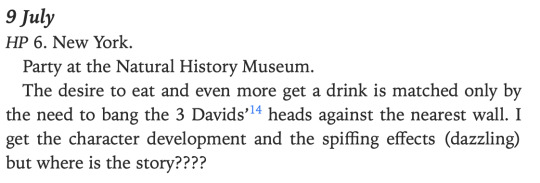
He describes how, during the filming of the Yule Ball scene in GoF, there was an attempt to get him to dance but he refused because he didn't think Snape would dance:

It was a rare moment of potential for improvisation because, again, the set and cast and timing were already accounted for, and in this case there wasn't even dialogue. The scene where he smacks the boys with the notebook - as far as I know - was scripted. So there's a difference there in how much freedom he had, as an actor, to say no to what he was asked to do. Even in the above diary entry it's clear that, given his way, he felt the character wouldn't even be present in that scene, but he had no choice. This tells me that when he had more freedom to make choices, he did so based on his understanding of Snape as a character and, given that he was an actor who was both very respected (and got away with more than most) and also someone who could get argumentative about his character choices, I think this is the most apt lens to examine his physical work with Snape through.
Knowing that he wasn't interested in continuing the role of Snape after the first couple of films and that he was often frustrated with the lack of characterization and story arc, his physicality in his first scene in CoS (when he reprimands Harry and Ron for flying the car) says a lot. (Caveat that one of the reasons he didn't want to renew his contract was that the shooting schedule restricted his schedule and he wanted work on other projects, but I can't help but wonder if that had been the case had HP provided a more satisfying process.) It's almost certain that he had read all the available books by the time the scene in CoS was filmed, including PoA where Snape becomes apoplectic with rage in a way that, to a child reader, is comical (and intended to be) and to someone analyzing Snape is clearly rooted in triggered trauma.
Alan Rickman knew from the outset that Snape's motivation was his love for Lily, so he would have understood the dynamic between his character and Sirius re: who Snape thought sold Lily out to Voldemort. He would also have understood that Snape's reaction in PoA was more about distress and anxiety, and that this was connected to the promise Snape had made to protect Harry for Lily's sake. This would have therefore informed his portrayal of Snape's anger at Harry in CoS, and it's reasonable to assume that Rickman was trying to walk the line between the way Rowling portrayed Snape in full unhinged rage in PoA, what this tells him about this character when angered, and the connection between the moments in PoA and CoS when it comes to Snape's anxiety over Harry's safety. Unlike the author of a book however, who has full control of how they tell a story, Rickman was an actor in a film - an inevitably collaborative medium which therefore made his portrayal reliant on the decisions of others as well.
Chris Columbus, the HP movies, and feral Snape
PS and CoS were directed by Chris Columbus, the guy who directed both Home Alone and Home Alone II and Mrs. Doubtfire. He was a successful director from the 90s tradition of children's movies whose sensibility was informed by the era's attitude towards children's media: kids wanting to see themselves in narratives, in ways that felt empowering and allowed them to process the confusion of a world run by adults in playful, quasi-cartoonish ways within a 3 act structure where the villains - mean adults - get their comeuppance because it feels fair. One thing that set Harry Potter apart was that the villain was not the mean adult; Snape, the mean adult, is a character kids can hate and project their own experiences onto, but Voldemort is a true villain who represents evil and is vanquished by the hero. Chris Columbus established a tone for the first two films that was no longer apt by PoA, not only because it didn't work for the story, but because that 90s era of children's movies had ended and the culture moved on to more complex narratives (and Columbus has focused more on producing than directing since, because his style doesn't work for audiences anymore).
What's ironic about the way Snape's scene at the start of CoS comes off is that, in the book, there's a great comedic moment that's left out:
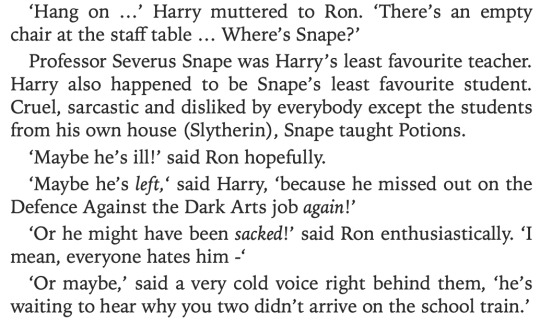
This is cut from the film, and instead it's Filch waiting at the top of the marble stairs who catches Ron and Harry being late and delivers them to Snape (I don't know why, the scene in the book is much more dynamic and would have taken up about as much time on screen). Rickman, meanwhile, is using the information he's gotten on who Snape is from the books, and imbuing some of that feral Snape energy into his portrayal of a Snape who is genuinely angry:

(Thank you for making these gifs @smilingformoney , they are truly the gift that keeps on giving.)
The thing is, no matter how much of feral Snape Rickman brought to this, no matter how menacing his performance is, this moment still lives within the dynamics of a Chris Columbus children's film. It gets cut off by Dumbledore's entrance - meant to be a comeuppance for Snape, since Dumbledore (being the voice of wisdom and fairness in this world) prevents him from punishing Harry and Ron (you know what, at least in the books they got detention, but ok). Despite Rickman's performance, Columbus as a director has framed this scene in the same context as the one Kloves cut. The tension is brief, and the focus is on Snape being foiled, because it's what children want to see - a mean adult experiencing consequences. It's down to the editing and soundtrack, choices Columbus made in the editing room. In addition, we don't know how many different ways an actor tries a scene, only what ends up in the final cut of a film. The process of the work done on a set is often much richer and more diverse than what an audience sees in the finished film.
Tbh I think this is also why Snape's feral moments were cut from PoA: it's a darker film, but had to straddle the line between being for both children and tweens and not getting too playful, nor too intense. As much as I want to see feral Snape on screen, it's extremely difficult to make work in a narrative that is about Harry and his friends. It either skews too intense, making the audience uncomfortable because seeing an adult becoming unhinged and in pain is difficult and frightening for most young people, even adults, and would therefore take away from Harry's goals and narrative as well as his changing relationship to Sirius (all of which is already barely supported by Kloves' writing). Alternately, it could also skew too comical and over the top, which takes the audience out of the tension of the film's climactic moments.
If Snape's story had gotten more focus and screen time, an unhinged moment would be better justified because the audience would have been more invested in the character and their arc. PoA sidesteps pretty much all of the most compelling parts of the book, which is the realization that Harry is not only connected to Sirius personally, but that his dad, Sirius, Lupin, and Pettigrew created the Marauders Map, that they were animagi, that Harry's patronus takes the form of his father's stag, and that Snape was initimately connected to all of them as well. For me, reading the end of PoA was what cemented Snape as someone who would be crucial to the narrative and whose role would increase as the series went on. As a result of Kloves skimming over these essential plot twists, Snape is a minor character in the film, showing up mostly as a foil who tries to expose Lupin and then catches him and Black in the Shrieking Shack (this also sets his character up to be minimized in every film down the line, which has a worsening impact as Snape becomes increasingly integral to the plot).
One thing I find interesting is that Snape's comical physicality changes over the films. In PS and CoS he's menacing, a looming, larger than life figure the children fear and easily assume to be a full-fledged villain. By GoF there's a relationship embedded in how he interacts with Harry and his friends. He's no longer terrifying, just intimidating, more of an adult Harry challenges than someone he must defeat. The comedic effect now comes from a rapport within an established dynamic between characters. By HBP, the only comical moment is at Slughorn's party, and it's no longer Rickman who uses physicality - the action happens around him, and the comedic effect is in his lack of reaction to any of it. In other words, he's no longer the comic one, he's become the straight man in a (badly written) comedy sketch (with abysmal timing, what even).
Ultimately, as with most of the characters in the HP films, Snape is undermined by the writing. Rickman was stuck working within the confines he was given. No matter how well he may have understood the character, the limited screen time and character development were always going to stifle how Snape was portrayed on screen. I'm very much pro Let Snape Be Feral but I also don't fault Rickman in how little we saw of that.
How Feral is Snape?
If I'm honest, I feel like the Snapedom has taken the Let Snape Be Feral thing and has started forgetting that he wasn't all-feral-all-the-time. The point of Feral Snape is that it's a heightened state of tension in a character whose trauma is being triggered. Apoplectic Snape wouldn't have an impact at the end of PoA if that was his usual way of being. And, as you so brilliantly showed @said-snape-softly Snape's speech patterns are primarily quiet and controlled, his speech gets softer the more dangerous his mood, and it's only after he reassumes his role as a spy that the description of his speech becomes increasingly volatile (but is still controlled). Feral Snape's definitive aspect is the lack of control shown by a character who usually is so exceptionally capable of self restraint and compartmentalization. So again, while I would have loved to see Feral Snape on screen, I think it's also important to acknowledge that this is not the defining feature of his character and is more about what those moments mean to his arc. Their absence is primarily due to poor writing that didn't create space for them (including what leads up to them), and the direction that didn't carve out any kind of niche for them, not Rickman's choices as an actor.
In fact, Snape as a character is defined by descriptors of his voice more than any other character by far. I have my own theory about why this is, and it has to do with Alan Rickman being inextricably connected with how Snape is written. Chris Columbus said that Alan Rickman was always Snape as far as he was concerned, because when JK Rowling showed him a sketch of Snape she had made, it looked exactly like Rickman. I don't think this is accidental.
Alan Rickman was always intended to be Snape
First, what's important to remember is that before Harry Potter, Alan Rickman was best known in the 90s for playing both villains and sad romantic leads. His signature defining feature was his voice. I think it was Ang Lee who described the casting choice of Greg Wise and Alan Rickman in Sense and Sensibility as wanting Willoughby (Wise) to be dashing and Brandon (Rickman) to be sexy (if this was Emma Thompson and not Ang Lee, my apologies, I can't remember where I read this and can't find the source). This is how Rickman was perceived by audiences up until Harry Potter. And I know a lot of the Snapedom considers him to be sexy as Snape too, but the general audiences of the films don't, so please don't @ me, I'm just setting up a point here.
This is relevant because, as we find out in the end of the books, Rowling wrote Snape's motivations to be rooted in romantic love (I'm very nobly putting aside, for the sake of focusing on Rowling's intentions, my personal interpretation that Snape's feelings for Lily were platonic, please acknowledge how brave I am for this). She pulls a lot from gothic tropes into how he's written, and as much as she's talked about the character having been inspired by a chemistry teacher she disliked, and as much as she's talked about Snape being both morally grey and someone she personally dislikes, she also romanticized him. Between this and what Chris Columbus said about her sketch of him, it's hard for me to ignore that this character, conceived of in the 90s, wasn't written with Alan Rickman in mind from the beginning, especially since Rowling herself has said that she envisioned him in the role. Whether or not he lived up to Rowling's imagination is, frankly, his choice and Rowling's problem.
The story of how Harry Potter was written according to JK Rowling is that it started with the idea coming to her on a train ride in 1990. She completed the PS manuscript in 1995. While everything I'm about to say is absolute conjecture, I can't help but wonder at the connection between these films and the way Snape was written (spoilers ahead, no regrets, these films have been out for over a quarter of a century - forgive my reviews, I can't help myself):
1988: Die Hard comes out. Alan Rickman plays Hans Gruber, a villain who is a genius, composed, controlled, and soft-spoken. (Great film, a classic, the only valid Christmas movie.)
1990: Truly, Madly, Deeply. Rickman plays a man whose wife can't get over his tragic death, nor can his own ghost, who comes back to spend more time with her. No one else can see him, and they can't really share a life anymore. She eventually lets him go as she realizes that his spirit doesn't belong in the mortal world and her own life can't move on as long as she clings to it. (Beautiful film, will break your heart and put it through a shredder.)
1991: Robin Hood, Prince of Thieves. Rickman is the Sheriff of Nottingham, an unhinged, feral villain who wears all black complete with billowing cape. (Terrible film, disaster of a period piece, Rickman's performance is the only redeeming thing about it. Halfway through its press tour talk shows started booking Rickman instead of the lead, Kevin Costner, because Rickman stole every scene.)
1995: An Awfully Big Adventure. Rickman is an actor who comes back to his hometown to revive his role as Captain Hook in a local theatre production of Peter Pan. In the process he has an affair with a young ginger stagehand who reminds him of his lost love, a vivacious woman named Stella with bright red hair who, as far as he knows, birthed his child - a son - before she died. It turns out the girl he has an affair with is his daughter, which he realizes when he visits her home where she lives in the care of her aunt and uncle - whose name is Vernon - and connects the dots of who this girl's mother was. (He then rides his motorcycle out to the pier, screams "Stella" at the heavens like he's in a revival production of Streetcar Named Desire, trips and hits his head on the edge of the pier and falls into the water, drowning. I can't make this up. Mike Newell directed this. The same guy who directed GoF. As if following in the vein of the 90s movie obsession with incest as the controversial-trope-du-jour wasn't enough. I don't even need to review this, just sum it up.)
1995: Sense and Sensibility. Rickman plays Colonel Brandon, a forlorn, grieving man who lost his first love at a young age and spends most of the film pining for the only other woman he's ever had a romantic interest in. Wears all black, rides a black horse.
Given what a well-known actor Rickman was in the 90s - especially in England - and how connected his characters all seem to be to various aspects of Snape, it's hard not to see a connection. The entire premise of Truly, Madly, Deeply sounds like the inspiration for the Resurrection Stone in Deathly Hallows. The redheaded lost love whose child is left in the care of an Uncle Vernon in An Awfully Big Adventure is difficult to look past. All of these characters either exude menacingly soft-spoken Snape energy, feral Snape energy, or forlorn because of his lost love Snape energy. As a result, I feel like it's almost inevitable that Rickman inspired Snape, especially when you consider how known he was for his voice and how frequently Snape's voice is used to describe him. When Rowling said that she envisioned him in the role, it makes me wonder if she meant during the casting process for the first film, or well before it. I think his previous roles were a contributing factor in how the character was written in the books. After Tim Roth - who was originally cast in the role - had to back out due to scheduling conflicts, she got her way. Authors don't often get to choose who plays their characters, but in this case it worked out as the production thought Rickman was a good fit as well.
I'm done, I promise
So where does this leave things at the end of this horrendously long post? Rickman's choices of how he physicalized Snape - comedic or not - are only part of a larger whole. He was playing a character who was written based on his other roles, and limited by the shortcomings of how Steve Kloves translated that character from Rowling's books into his own screenplays. Whatever Rickman did on set was limited by that writing, by the directors he worked with, and by the choices made in the editing room.
I'm fascinated by the idea that Rickman was playing a character written with him in mind - but not really him, the him who embodied other characters whose echoes show up in Snape. It's difficult enough to contend with an actor playing a character in a screenplay you wrote with them in mind when you're directing your own script, because they'll never be what you imagined in your head. But for that process to get filtered through several directors, a team of producers, another writer who changes your work, and an editor, let alone throughout a decade of films - that's downright wild. The original intention gets lost and reinterpreted like a game of telephone, and I think that a lot of the consistencies between Movie!Snape and Book!Snape are down to Alan Rickman's nuanced and generous nature as an actor. If I'm honest, I'm not convinced that every Snape moment that comes off comical was meant to be so by Rickman. But again, film is such a collaborative medium that his intentions aren't the only ones that matter, ultimately, at least they aren't the only thing that ends up in the final cut.
My take, personally, is that I'm more interested in critical analysis than personal criticism. I respect that everyone has their own vision of a character and fandom is absolutely here for, among other things, having a place to share those thoughts and feelings. But a character is rarely going to appear on screen the same way you see them in your head, and that's not always going to be a fault, even if it's a disappointment to you. It's interesting to hear different people's perceptions, but there isn't that much to discuss there - you can't refute how someone feels, and you can't argue that their truth is what it is, to them. Whereas with critical analysis there's a lot more to talk about and examine, so it's where my own interest is much more invested.
#asks#long post#said-snape-softly#do I have regrets about the length? not one.#is anyone still reading? not one.
51 notes
·
View notes
Text
I began looking over the episode titles for S3 again… and that “Tick Tock” title has me mulling over some things… Book Spoilers below!
Spoilers / theories
I’m assuming that like in the books, someone (whether Cressida or someone new) tries to claim the LW title and so Pen is under a time crunch to print a denial… and of course Colin likely discovers her while she goes to do so… because the next episode title is “Romancing Mr. Bridgerton.”
(But being that the next episode title is “Joining of Hands” I’m worried they’re not going to give Colin at least a full episode to grapple with that reveal… sigh. He deserves to have time to feel and express his feelings—be they sadness or anger— about that…)
But I ALSO wondered with how the show IS obviously changing other aspects of the story, if maybe Colin or Eloise will be under a time crunch to do something surrounding Pen… to parallel the time-sensitive situations where Pen felt back into a corner and made decisions that had reachingn consequences.
Maybe Colin learns something about Debling , who we know is going to be a “serious” suitor for Pen (whatever that ends up meaning), that makes his interest in her dishonest or ruinous? (to attempt to parallel the Marina situation, though, not the same - poor Marina was in a desperate spot. Doesn’t excuse what she tried to do, but the girl had almost no options). I don’t even need/want Colin to be romantically jealous - Pen is his friend first, and would be trying to look out for her for her happiness… he just also happens to be hella horny for her now andmaybealittkeinlovewithhernohesnotindenial 🤷♀️
Or Maybe Eloise has to make a monumental choice regarding the Queen who is still hunting for LW? And Eloise, being the only one who knows her identity, is the only one who can do something to save her friend, even if she’s furious at her?
How I felt about it would depending highly on the execution of such a plot line. Because it could be amazing for the characters in terms of reconciliation and understanding where each person was coming from (can you imagine the conversations??) in this season and earlier ones… that being said, I don’t want it to be used as an excuse for Pen to not have to apologize, but it could be a powerful moment between Penelope and either Colin or Eloise. A “walk in another person’s shoes” moment, if you will, where all characters involved realizes that nothing in those situations was clear cut. No one was blameless.
…but it would be a big departure from the book.
But so many things are already different - I want the story that has BEEN told with THESE versions of the characters to be done well… not just book accuracy for the sake of it.
ANYWAY, I’m tired of all the vitriol I’ve seen floating around for various characters. I have faith the writers will give us something satisfying.
I love Colin (my soft boi is the BEST male love interest on this show FIGHT ME)…
and I love Pen (shy, complicated, multifaceted, both powerful and powerless in equal measure, has a complete lack of real vulnerability out of fear… I don’t know if I’ve ever encountered a character like her before)…
And I can’t WAIT to see what this season does with them 🩵
15 notes
·
View notes
Note
I know j!dream uses dresses and that kind of clothes bc of the thing he has with j!sam on the bird house and in one of the good endings were he escape we see him still using them so is it that this was a from of dressing and expression he already had from before all j!sam madness or he find a way to reclaim it as something for himself now?
yeah--the clothing tends to be something he views positively in the birdhouse, honestly. (does conditioning play a part? yes. but a lot of that is um, how do you say,,, self-designed? i guess? wearing pretty clothes by his own volition encourages sam to treat him better which encourages dream to wear more pretty clothing etc.) it's not all dresses/skirts, obviously--j!dream tends to be the one that assumes that j!sam wants him to dress fem more than the other way around (j!sam has wanted this man carnally for two years while wearing a prison jumpsuit in various states of being beat up and/or looking like a drowned rat. kind of safe to say that this man's standards, as long as it's dream, are not particularly high.)--but a lot of the clothing no matter what specific gender presentation is umm somewhat revealing, when he's in the birdhouse
a lot of this from j!dream's pov is about like, power. getting sam to be attracted to him is the greatest power that he has in their dynamic, something he had tried for in the prison and didn't achieve until mayfair. getting sam to stare is something that makes him feel safer. and there's a big part where he's trying to combat how he felt in the prison, alone and in pain and wondering when the hell sam would next come back to make the stupid dispensers stop. he felt abandoned and alone and unwanted and undesirable, by himself at the back of the cell with nothing but sam's torture machine and his own tired, pain-addled thoughts to keep him company. in comparison, the power to make sam stay through his body is another kind of high.
i kind of write j!dream to be a little bit ambivalent about his gender and expression--pre-prison, he would've focused more on practicality and survival, which meant that the way he looked was thrown mostly to the wayside. between the mask and the armor, the main aspects of self-expression boiled down to expressing himself as someone untouchable. in some ways, the big ass closet and its many different outfits and j!duo's whole...thing were the first time he really dressed for practicality of a...different sort, and he does have a measure of fun with it (when sam isn't choosing for him, anyway.)
for him, whether it's during birdhouse or after, he definitely likes feeling attractive and desired by others, whether that be sam or others, and while a big part of that is the super messy cocktail of emotions and conditioning that ends up happening surrounding sex in birdhouse, that stuff also isn't all that easy to untangle just because he's out of that environment, either. with the exception of a few more extreme cases (ff!sam. is a strange man.) j!dream never really internalizes the clothing as something that sam forces on him as much as choices he makes himself to seduce sam into treating him better, if that makes sense, so he'll continue to approach clothing and how he chooses it as ways to shape other people's perceptions of himself for his own safety and survival for,,, a long time.
so yeah, even post-birdhouse he'll still probably dress to look Attractive in a way that didn't matter to him the same way pre-prison, both as a self-comfort (this is something that keeps him safe) and as a means of appeasing other people (in his own head). that being said, there are some changes post-birdhouse in his wardrobe eventually; he'll start dressing more comfortable with time (a lot of his clothing wasn't really designed to be warm, and as such he was quite often pretty chilly in the birdhouse, which sam kept a little on the cooler side), and if he's actually going outdoors more then he'll have to dress a little more practically under armor, etcetera.
#birdhouse AU#mayfair AU#my asks !!#j!dream tends to tailor his clothing to what seems to work best for his situation#to him choosing to wear a dress that makes sam look at him is much better than a drab prison uniform that's forced on him#etc etc whatever#the difference is especially highlighted by c!dream who kind of dresses like shit as much as possible in deliberate contrast with j!dream#and also just gets beat up more because he's never learned to shut up ever
14 notes
·
View notes
Note
You've mentioned before that you had a journey with Remus and now you have a specific characterisation of him. What works for you when you read him in fanfic?
.I've spent 3 days in Remus headspace, both for my own fanfic and to help @bluethepineapple with her lovely character study - Of The Fallen (read it now!). So I have a lot of thoughts on what makes Remus work for me.
My reading of Remus, first of all, is very Watsonian. In that, I recognise there is a certain author intent in that he doesn't necessarily come across the way she means it to (for example, I don't think she intends for him to come across as manipulative as he does). That's fine by me - because I think Remus, as in text, is far more interesting and complex this way. So here are my non-negotiable Remus traits that works for me in fanfiction:
1. He hides his anger. In fact, he is extremely guarded about his inner world.
The offhand line where Sirius mentions in OOTP about Umbridge ("You should hear Remus talk about her") shows how much of himself Remus carefully curates away from the world, because of the "occupational hazards of being a werewolf." Harry sees that anger, anguish and self loathing in full force in Deathly Hallows, and he sees a breakdown of Remus at end of HBP (where Harry felt he was encroaching on something private. And Harry is right to sense it - Remus would not have wanted anyone to see that breakdown! ). Even with Harry, it took until Harry reliving James’ death for Remus to admit that they were friends. It takes a lot for Remus to slip up and reveal something about himself.
So his anger, unhappiness slips by in moments of passive aggression, or complete avoidant shut down. I go into this more with a meta with wonderful @thecat-isblogging-blog : The Gentleman Monster and this meta by criesbyjudas
For Remus in all his passive aggressive glory: Verbal Fencing Over the Marauder’s Map
2. He idolises James, while his dynamic with Sirius is a little more complicated.
James is the ideal for him - the confident golden boy. An embodiment of reckless teenager Remus wishes he could experience (and does, through his various adventures with them). The way Remus talks about him is fond, and is unwilling to cast him in a bad light - he also, in a moment of weakness, turns to Harry invoking James’ name (”James would have wanted me to stick with you”). Meaning, that in Remus’ mind - James is a refuge when things get overwheling for him. He is a protector. (With regard to Peter, Peter is a representation of himself - an underdog who needs to be protected. Remus gets to perform the protector here by bringing him into the fold)
His dynamic with Sirius, on the other hand, is complicated. Sirius is his shadow aspect projection, a boy who can display anger and be combative against the world in ways Remus can't afford to because of the very prejudices the world has against werewolves. Remus wants to be the “good boy” who likes to be liked. @thecat-isblogging-blog wonderfully put it as, "There's an envy - it plays also on how they are both in the 'canine family' but Sirius has choice and consciousness. Which Lupin does not." (For envy, refer to Remus' schoolboyish regression of "He always got the women" on Pottermore). Of course, you can play this aspect of the dynamic any way you want - it lends well to queer readings too!
I’ve talked about the Marauder dynamics in SWM here: - the meta analyses the scene in terms of the interpersonal relationships in the group, post Prank.
3. The forest runs make him happy.
This is crucial to me. However guilty Remus feels in retrospect, he explicitly is said to enjoy the runs (”best times of my life”). His spirit is happy to be back in scene of adoloscent wanderings in DH, he refers to himself and the Marauders, “young, thoughtless and carried away with our own cleverness.” @urupotter brilliantly put it as - his jaunts as a wolf with his friends is a way to exert control over the wolf/his condition in a sense. The wolf may command his body, but it acts under parameters he and his friends set. He recognises the danger, he feels haunted at the prospect of what can go wrong - but it is also something he enjoys. Too many interpretations of him forget what exactly draws him to friends like the Marauders and why this friendship is so formative for him. They have offered to help him experience a source of shame and self loathing, a creature that his father once denounced as “soulless, evil”, as an embodiment of freedom and youth. There is a psyche integration that is happening here that is ripe for rich explorations of Remus’ character.
4. He would have killed Peter in POA and would have lost no sleep over it
I mean, that is an exaggeration - I do think there is a part of him that will always wonder how things went that south. But I don’t think he (or Sirius for that matter) would have regretted it (points to Remus being aghast at Harry’s expelliarmus in the air in DH, and then later on comparing him to James XD). What I love about POA is that the moment Remus appears in the shack, he already believes Sirius. He just doesnt have the full story - but he has an inkling what happened. So the entire chapter of exposition where Remus is asking questions of Peter - he is cornering Peter into incriminating himself more, thereby building up his own anger - which gets colder and quieter. I mean, look at this chilling line - “You should’ve realised... if Voldemort didn’t kill you, we would. Goodbye Peter.”
Other stuff that is fun:
- he is a good DADA teacher! His interest in Dark Creatures (probably comes from his father - given what Lyall does, as per Pottermore) takes on more interesting dimensions because he is himself seen as one by the Wizarding world. What does this mean for him? Cat and I tried to explore this in Toys in the Attic.
Yeah, these things are what makes Remus to me. So if these aren’t present, then it’s most likely not my cup of tea. :)
125 notes
·
View notes
Text
Sorey and Mikleo at the core of Zestiria

長谷 人間と天族の共存を象徴するのがあの2人の絆なので、どういう決着にするかはいろんなアイデアが出ましたね。
HASE: Since the bond between the two symbolizes the coexistence of humans and seraphim, there were many ideas on how to put a conclusion to their story.
Those two.
I know I have talked a lot about Sorey and Mikleo, but at the same time, I feel like I haven’t talked enough about them yet. It is certainly one of the relationships that is often talked about in the fandom, but for how much they’ve been brought up, there is surprisingly not much effort to actually analyze what makes them work in the context of Zestiria.
I would like to begin this with bringing up the core themes or ideas underlying Zestiria as a story: the specific genre name, “Passion will light up the world” (“情熱が世界を照らす”), and “Legends will someday become ‘Hope’” (“伝承はいつしか「希望」になる”). I want to keep these in mind when talking about Zestiria as a whole.
The idea of “passion” being the heart of Zestiria actually came up when the creators wanted to incorporate the “passion” of Sakamoto Ryouma, a Japanese historical figure, a low-ranking samurai in the late Edo period, as revealed by the director, Hase Yuuta, and producer, Baba Hideo. They were enamored by the fact that he was a low-ranking samurai, yet through his deeds, managed to indirectly change Japan. It was his passion and love for Japan that exactly made him think that Japan could not remain the way it was. Then, intertwining in various ways with people in various positions, the world moved on. He didn’t try to move the world, but the results of his actions moved and changed the world.
Elements from Sakamoto Ryouma’s life and personal figure can then be found in various aspects of Zestiria. We do things because we want to do it, not because we have to do it, yet both of those things are important, so how can we realize both of them without sacrificing one or the other? Sakamoto Ryouma also left his small hometown, out to the vast world. The part where he originally did not want to change Japan, but ended up changing Japan while he was pursuing his own dream. The part where Sakamoto Ryouma was thought to be able to see things “differently” from others who had lived in the same era, as well, like how Sorey is able to see the seraphim.
長谷 坂本龍馬の要素を全部スレイに持たせることはできないので、実は一部をミクリオが持っていたりします。あまりにも感情的な行動をするとユーザーさんとの気持ちがかけ離れてしまうおそれがあるので、スレイは意外と冷静で落ち着きがあります。むしろ、クールに見えるミクリオのほうが感情的ですね。
HASE: It is not possible for Sorey to have all the elements of Sakamoto Ryouma, so actually, Mikleo has some of them. Sorey is surprisingly calm and composed, as too much emotional behavior could lead to a disconnect with the player’s feelings. If anything, Mikleo, who seems cool, is the more emotional one.
Which might seem familiar, since the head writer also said the same thing, and I see this quote being thrown around a lot anyway:
山本 [...]そういう意味ではおとなしい主人公に見えるかもしれませんが、熱い思いはちゃんと持っていて、叫んだりノリや勢いだけで解決しようとはしないキャラクターにしたんです。代わりに、ミクリオをストレートに感情表現するキャラクターにして、2人で1人の主人公のような言動をとるように工夫しました。
YAMAMOTO: [...] In that sense, [Sorey] may seem like a calm protagonist, but he has passionate feelings, yet does not try to solve problems by shouting or just going with his spirit or momentum. Instead, we made Mikleo a character who expresses his emotions in a straightforward manner, so that the two of them act and speak as if they are one protagonist.
So they were concerned about Sorey being too unrelatable if he is fully modeled after Sakamoto Ryouma, who seems like someone bigger than life when you look at him throughout the history, as such, they divide the elements inspired by the figure into two characters, Sorey and Mikleo. This is because despite the fantastical framework they worked with on Zestiria, they also wanted to convey that the legends also lived in us all. That the characters that lived through those legends, were also just like us. That point is important.
――どのキャラクターも強い個性をもっていますね。
山本 シナリオチームには「物事でドラマを描くのではなく、キャラクターの心情を繋げていくドラマを作ろう」という大きなテーマがありました。勢いだけで動くのではなく、互いを思いやる部分やそのときの心情によってキャラクターからどういう言葉が出てくるのか、というのをリアルかつていねいに描こうと。なので、その言動から、スレイたちが何を考えているのかを読み取っていただけるとありがたいです。
――Every character has a strong personality.
YAMAMOTO: The scenario team had a major theme, “Rather than a drama based on certain things, let’s create a drama that connects the emotions of the characters.” We do not want the characters to only act because of the momentum, but to realistically and carefully depict what kind of words the characters would say depending on their emotions and how they care for one another at the time.
――ストーリーを作るにあたって、特に苦労した部分がありましたら教えてください。
山本 やはりその心情ドラマが非常に難しくて、何度も修正しました。RPGとしては目的を提示したり、これはこういうことですよ、と書くほうが楽なんですね。事件でストーリーを繋げていくという。ただ、今回はそれよりもキャラクターの性格との整合性を重視して何度も書き直しました。セリフの収録でも、役者さんにキャラクターの細かい心情を大切にして録ってもらったので、後半になると役者さんのほうから「このセリフってこのキャラクターだと言い方が違うんじゃないですか?」という意見も出てきました。「じゃあ先に行こうぜ」と言うのか、それとも「ここにいてもしかたないよね」という語りかけにするのか、といったちょっとしたニュアンスの違いなのですが、そういうセリフひとつでもキャラクターらしさを重視していました。
――Please tell us if there were any particular challenges in creating the story.
YAMAMOTO: That emotional drama was very difficult, after all, that I had to revise it many times. As an RPG, it is easier to present a goal, and write based on “this is what it is all about.” Something like connecting the story beats with certain incidents. This time, however, I rewrote it many times, focusing more on consistency with the characters’ personalities. In the recording of the dialogue, we asked the voice actors to record their lines with the importance of the detailed feelings of their characters, and in the latter half of the production, the voice actors instead would suggest, “This line would be said differently by this character, wouldn’t it?” It may be a small difference in nuance, such as whether to say, “Let’s go ahead then!” or “I don’t think we should stay here,” and even in such a single line, we focused on the character’s personality.
I know it seems like I’m not getting anywhere with this, but bear with me. So we have both Sorey and Mikleo sharing parts of Sakamoto Ryouma, but what I personally find interesting is that Sorey takes the parts of Ryouma that are more “legendary” about him (e.g. he brought upon a huge change without meaning to, he was believed to have seen something invisible that couldn’t be seen by his contemporaries) and Mikleo takes the parts of him that are more mundane (e.g. that he was full of emotions, very expressive). On the outset, Sorey as a human is regular-looking, and Mikleo, as a seraphim, has ephemeral, otherworldly qualities to his appearance... but even in the game, Sorey is the one depicted as being a child of miracles, the only human amongst the seraphim, someone who keeps going against all odds, the one Shepherd with a special end to his journey, and Mikleo is “merely” a young seraph who doesn’t even know a lot of things about his kin.
(Just like how we see things through Sorey’s eyes, and how he learns from the various humans he met and parted with along the way; when it comes to how seraphim work, we usually learn about it because Mikleo, the youngest seraph he is, is curious enough to ask about it from his seniors. You can see it in the skits in-game.)
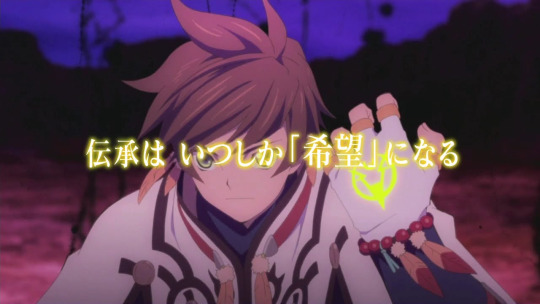
伝承はいつしか「希望」になる
Legends will someday become “Hope”
I’ve talked about in detail how Zestiria is hugely inspired by Shinto, and, subsequently, places a great importance on legends and history just like Shinto as a religion. The catchphrase of the game nicely illustrates this. However, one thing I’d also like to point out is that it’s easy not to think too deeply into “legend” as an English word, we tend to take words for granted after all. I don’t know if what I’m saying is making any sense, but Zestiria is a work that chooses its words very carefully and you’re supposed to read between the lines.
In the Japanese word for “legends”, “伝承”, lie implications that might not be immediately obvious to people who can’t read Japanese: that legends are transmitted, imparted, handed down (伝える), and that legends are received, taken in, accepted (承ける). There is a give-and-take relationship here, it’s not a one-way road.
The epilogue in the novel, focusing on Mikleo like in the game, emphasized more on this:
永遠に流れる時の中で、人の一生はまるで一瞬の光だ。けれど、語り継がれ、受け継がれた意志は長い時を超える。伝え続けたいと思い続ける限り。
遺跡もまた、語り続ける意志だと青年は考えていた。時を超え、未来へ伝えたい思いを形に残し、いつか受け止めてくれる人を待つ。
いつまでも、いつまでも。
その意志を余すことなく受け止めたい青年は、ひとりでここを再訪したのだ。
In the time that flows eternally, a human’s life is like an instant flash. However, the will that gets handed down and inherited transcends the long time. As long as we want to pass it on.
The young man believed that ruins are also a will that can continue to get passed on. Transcending time, leaving behind a shape of thoughts that they want to convey to the future, waiting for the right person to accept them someday.
Always and forever.
The young man, wanting to take in [to accept] all of this will thoroughly, revisited this place alone by himself.
Humans and seraphim are fundamentally different beings: time flows differently for both, humans accept external changes, seraphim stay the way they are due to their nature as incarnations of the purest hearts. To Mikleo, whose passage of time is comparatively stationary, seeing Sorey, a human, who keeps changing (growing; maturing) just makes their fundamental differences even more obvious, so of course it gives him complicated feelings on the whole matter.
Just before, they were the same height, then Sorey grew even taller than he was, as highlighted in the manga. However, the Sorey that has lived up until now, still lives on inside Mikleo anyway. After all, they’d been together all their lives up until then.
…陪神になってスレイと同じ使命を感じてなんとなくあの時僕を拒んだ理由がわかった
導師の使命も世界も知らないただイズチにいた頃のままの僕らをスレイは残しておきたかった
…As I became a Sub Lord and feel the same calling as Sorey, somehow I understood why he refused me to become one at the time.
Sorey wanted that that part of us, that didn’t know of the Shepherd’s calling nor of the world, just staying the way we were in Elysia, to still remain.
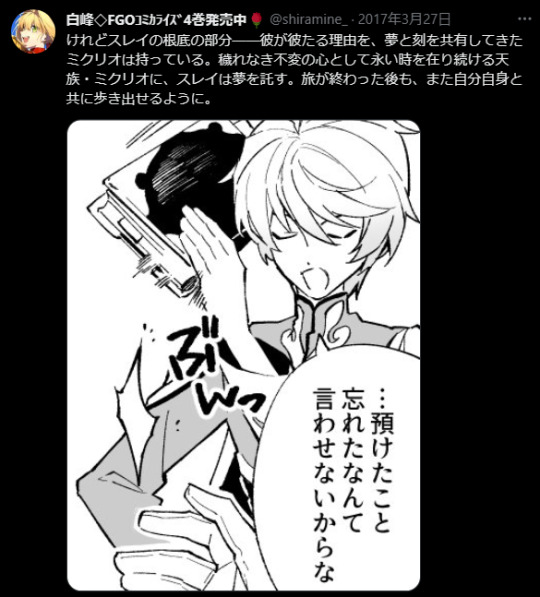
But Sorey’s core―the reason for why he is who he is―it’s Mikleo, the one who has come to share his dream and time, who has it. To Mikleo, a seraph who will continue to be for a very long time as an untainted and unchanging heart, Sorey entrusts his dream. So that after this journey ends, he can walk with himself again.
Sorey, the childhood friend who holds the dream of seeing a world where humans and seraphim could coexist, won’t go anywhere, as long as Mikleo is there, even if Sorey changes. Even Sorey, the one who carries on the Shepherd’s burden, isn’t going anywhere, because that will is carried on to the next generations, by Rose and the succeeding Shepherds.
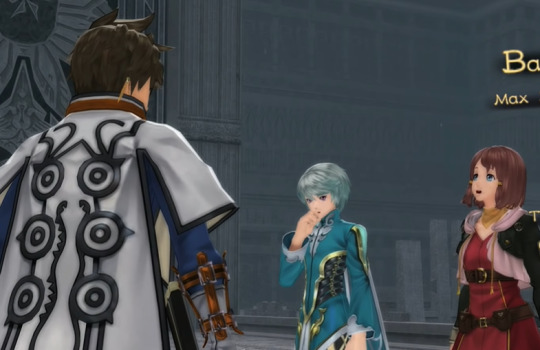
Speaking of Rose, I think her role in the story as Sorey’s foil will highlight Sorey and Mikleo’s relationship even more (this is not saying that Sorey and Rose’s relationship is any less important, just that it’s a different form of relationship). Even from the character design perspective, Sorey’s gold/orange (the image color that is used for him in both the World Guidance and the manga) and Mikleo’s teal are complementary colors, their eye colors (green and purple) are also complementary colors, and they share the color blue as well, whereas Sorey’s blue and white contrasts Rose’s red and black. I believe this is deliberate, as deliberate as Rose and Lailah sharing the color red yet contrasting black and white, because from the information that has been revealed, Fujishima and Inomata as the veterans of the series were asked first to design two humans and two seraphim respectively, based on their styles, and that their characters would be the main focus of the work.
(Which I also believe is the basis for why it is Sorey [Fujishima] and Mikleo [Inomata], Lailah [Inomata] and Rose [Fujishima] in the night before final battle scene, a scene that has held importance in the entire Tales of series.)
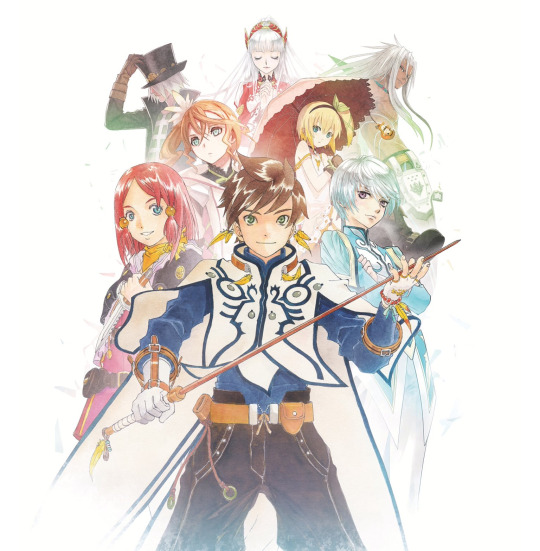
Also, I want you to pay close attention to the key visual for Zestiria above. I will also bring this up again:
右手は身・体の、左手は霊・心の在処
The right-hand side is where the physical body is, while the left-hand side is where the spiritual heart is.
To his left, Mikleo, the Sub Lord, and to his right, Rose, the Squire. Lailah, the Prime Lord, on the far back, evoking that distant feel of the mystical, of the legendary, in the same center as him, the Shepherd. Sorey and Rose actually have a lot in common that are easy to miss... they both grew up with seraphim, sort of, and it cultivated in their pure hearts and high resonance. They’re both humans. But it is with Mikleo, the one who’s decidedly different kin from him, that he has complementary relationship with.
Maybe Zestiria wants us to focus more on their similarities, than their differences, when it comes to Sorey and Mikleo. However, humans don’t grow if they only hear what they want to hear; they have to be challenged, and besides, if you’re going to step into the world out there, there are many kinds of people, people with different views and approaches from you. This is what is needed for Sorey to meaningfully grow. So despite the similarities, Rose is the one human who Sorey knows, outside from himself, that lives with a seraph yet rejects them vehemently at first. That each of them has their own role, to give life and to take life.
This is getting more and more about Rose instead, but I promise I have a point to make here. Besides, it was also Mikleo that managed to convince her to join, for Sorey’s sake.
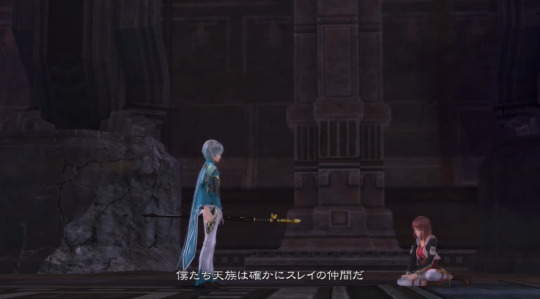
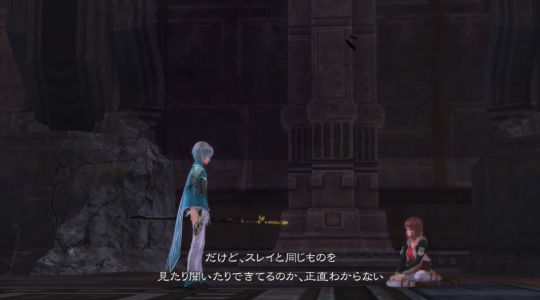
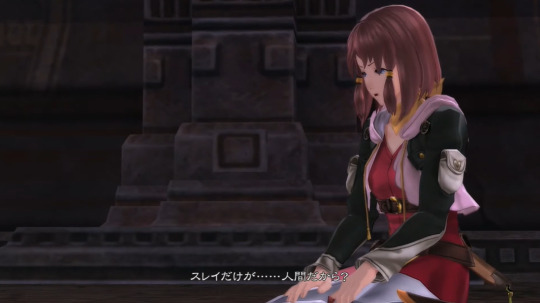
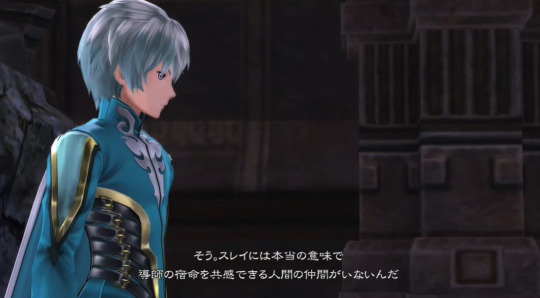
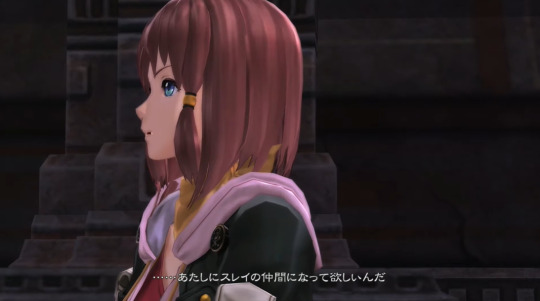
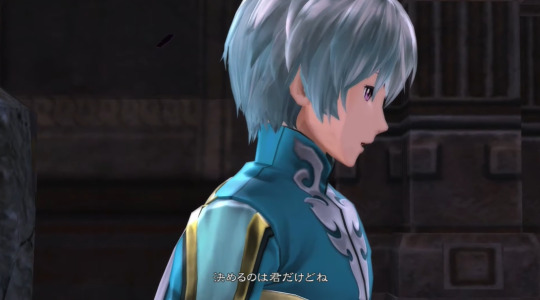
MIKLEO: We seraphim are indeed Sorey’s friends.
MIKLEO: And yet we cannot say for sure if Sorey sees and hears the same things we do.
ROSE: Because he's... the only human out of all of you?
MIKLEO: Yes. Sorey has no human compatriots who can truly understand the burden he bears as the Shepherd.
ROSE: You want... me... to join him.
MIKLEO: It's ultimately your call.
Pay attention on the camera positioning, on how Mikleo is on the left on the screen talking to Rose on the right of the screen. It’s not enough for Sorey as a character who has been surrounded by seraphim his whole life, to just be surrounded by a party of seraphim, yet it was Mikleo who first realized this instead of Sorey himself. Also, it wasn’t just in the way he didn’t force her to join Sorey, but the way he was also so gentle in his word choice, even telling her that it was okay for her to be scared of him.
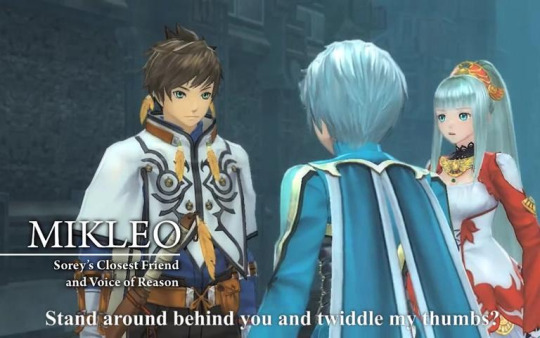
This is why I like how the English trailer dubbed Mikleo as Sorey’s “voice of reason.” Sorey isn’t exactly unreasonable himself, but I think this fits nicely with the designation that in the end, Mikleo chooses to act as the “spiritual heart” to Sorey’s “physical body.” I deliberately use the word “choose” here, because, just as it was Sorey’s choice to be the Shepherd, it was also Mikleo’s choice to fight alongside him.
天族とは誰かの想い、誰かの祈りから生まれた露な<人の心>そのもの。
執行者の名を持つ天族は、その心の最も純粋な形として生まれた化身。
Seraphim are born from someone’s thoughts, someone’s prayers; they are the very bare “hearts of humans” themselves.
Seraphim bearing the name “Enforcer” are incarnations born as the purest form of those hearts.
It was implied that Mikleo, the seraph, was born from the thoughts of Michael that were paradoxically both his hope and his despair. And I’m sorry for repeating myself here, but these pages of the manga really spelled it out (I have an entire post on Sorey, Mikleo, and Growth here and here):
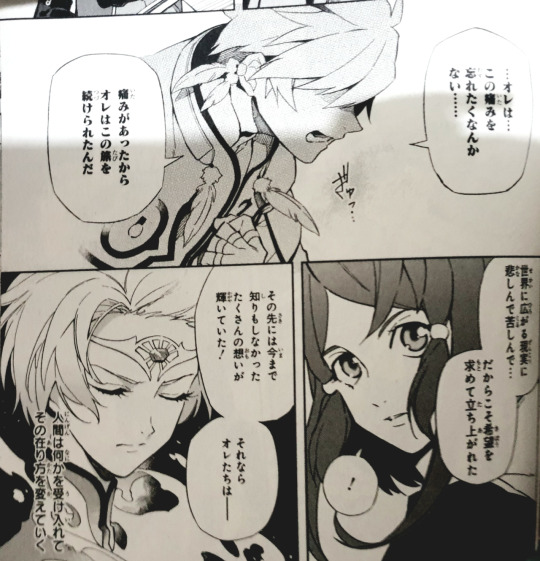
SOREY: …I never… want to forget this pain…
SOREY: It’s exactly because I felt pain that I was able to continue this journey.
SOREY: We’re grieving, suffering because of the reality across this world… and that’s why we are able to rise up for hope.
ROSE: !
SOREY: Many feelings even beyond that I had never known before were shining through! That being case, we—
MIKLEO: (Humans accept [receive] something, and with that, they change their way of being.)

SOREY: We’re not afraid to go down this road!!
MIKLEO: (With time, you grow taller. With your calling, you don the mantle. If you, with all that, are willing to accept the pain that tries to dye you…)
MIKLEO: (Then I, the seraph that resides within you, as the thought that you are who you are, will draw the bow together with you.)
(Another neat detail is how on the first page above, the paneling positions Mikleo on the left and Rose on the right.)
So Mikleo was born as Michael’s hope and despair, but decides he will act as the thought that Sorey is who Sorey is. The left to his right. The spiritual to his physical. The seraph to his human.
Choice indicates agency here. I will always remind people that Zenrus has never raised both Sorey and Mikleo to be the Shepherd and his Sub Lord, even though Muse did suggest that idea to him when he took them in. No, they came to accept these roles themselves. The one thing they learned from Zenrus was the dream of coexistence between humans and seraphim, basically the core idea of Zestiria itself.
And their bond is conceived to symbolize the possibilities of that coexistence.
(Speaking of Muse, I want to bring up that there are only two story-related weapons in the game (as in, weapons used/obtained through story and not by loot): the first is Lailah’s Sacred Blade, used by Sorey when fighting the hellions during the Sacred Blade Festival, and the second one is Muse’s Staff, used by Mikleo. I feel these weapons nicely represent Sorey’s connection to the seraphim and Mikleo’s connection to humans outside of each other.)
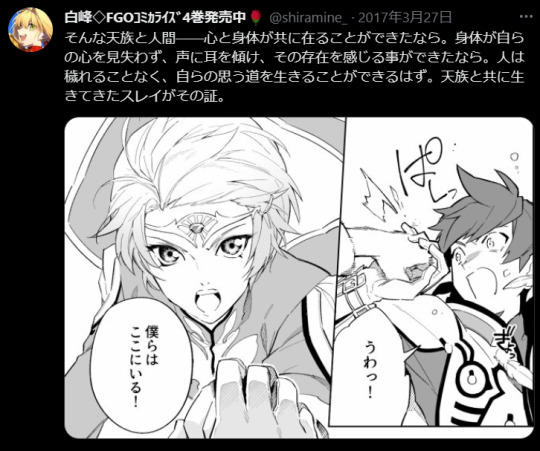
If such seraph and human—heart and body could exist together, if the physical body could not lose sight of its own heart, could listen carefully to its voice, and could feel its presence, then humans should be able to live the way they want to live, without being tainted. Sorey, who has lived with the seraphim, is that proof.
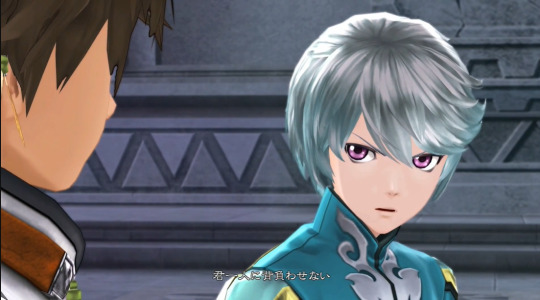
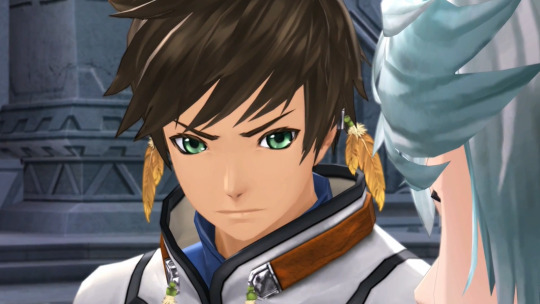
I won’t let you carry this by yourself.
They share their passion together, they share their inherited will together; for that, they share the burden needed to get there. Personally, despite what I might seem like, I’m actually detached when it comes to liking characters... I don’t really care about the characters individually themselves, and this might make me seem like I don’t care about them personally, but it’s more like that to me, characters cannot be divorced from the narrative and context they’re supposed to work under. Sorey and Mikleo are obviously intended to be the symbols representing what humans and seraphim (the right and the left, the physical and the spiritual, the body and the heart) can do for one another, and legends are full of those symbols. Their unspoken, unseen bond, often described as something like tacit understanding/heart-to-heart communion (以心伝心) also contributes to that feel of seeing something transcendental you often find in legends and folktales, because even words are not necessary anymore, it’s shown in every step they take for themselves and for each other.
Yet at the same time they’re also depicted just as boys. They can get to be happy over the smallest things, they get into heated arguments, they tease each other, they get worried about each other, they don’t want to lose to each other... they are so normal, despite what I’ve said about them before. They’re both symbols and realized characters that I can relate to on a more personal level, and there is multiple facets to both their characters and relationship. I think that’s the best way to show what living in harmony with the world, with the history, with everything that has been there all along without us immediately realizing it, means. They really are there to embody the themes and messages of Zestiria together.
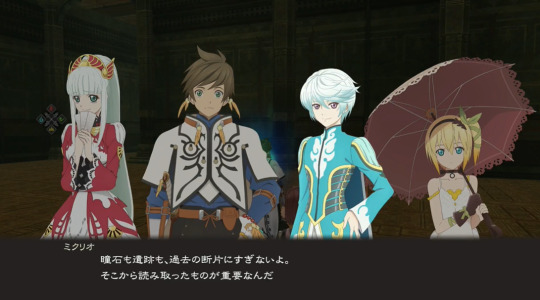
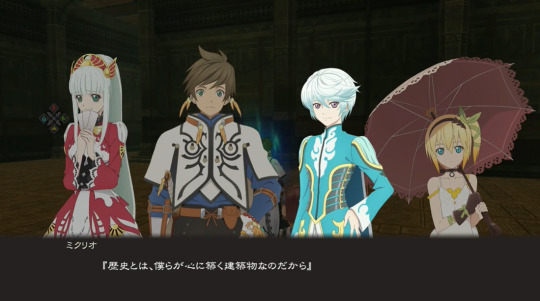
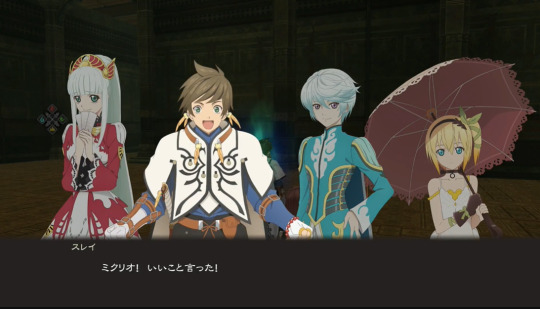
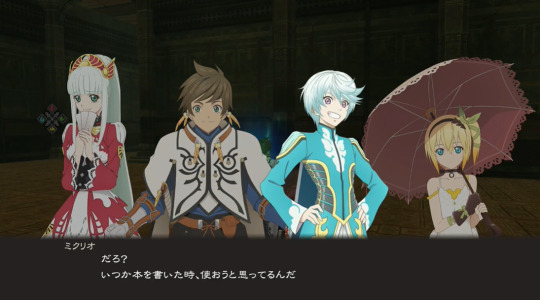
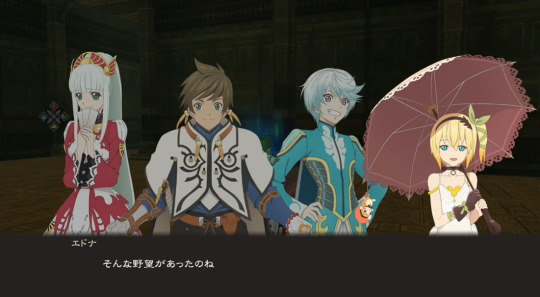
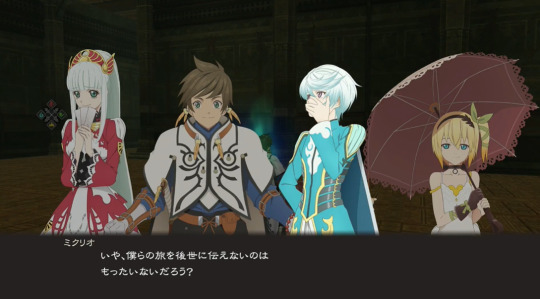
MIKLEO: Both iris gems and ruins are just fragments of the past. What’s important is what you get out of them.
MIKLEO: “Because history is the architect of our hearts.”
SOREY: Whoa, Mikleo! That was a sweet quote!
MIKLEO: You think so? I’m planning to put it in the book I write one day.
EDNA: Well, aren’t you full of surprises.
MIKLEO: I mean, don’t you think it'd be a waste not to pass on our tale to future generations?
Yes, the details and nitty-gritty are important, but above everything, it’s the bigger picture. What you get out of them. And what I get from them is that hope is not created but inherited. Their journey, their tale not only carries on the hope from the previous generations, but to the next generations as well.
This tale begins with them and ends with them. It is their tale after all.
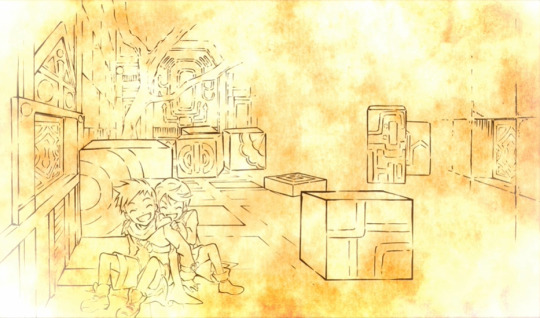
26 notes
·
View notes
Note
S3 Snow is done! :DDD
Vincent waking cold and traumatized with fearful eyes. Everything going over Father’s head with Stephen and Brooke at first. The scripts for Diana never disappoint: so fascinating to see her figure out the mystery step by step, putting her hands on everything, and immediately flashing back to Vincent. Snow and Gabriel’s dynamic is intriguing: it’s spelled out explicitly that Snow has more power in this moment, but the scene keeps whatever fear or concern Gabriel has close to his chest. The addition of Gabriel’s “Do you?” after Snow’s “politicians don’t come with a warranty” was an excellent choice. Gabriel making Snow salivate over the tape, the ring reveal, the son mention, Snow’s deflection, and Gabriel finally revealing how shaken he is… exquisite.
Diana’s apartment and the rose bush and Mark (I don’t see him sticking around for long-- probably will want someone uncomplicated before too long.) Diana can feel the life in the plant but Mark doesn’t think so. Mark’s “spelunking again?” has a resentful edge… iiiiiiiiiiiinteresting; and Diana’s let down reaction (with herself, the situation never being different, that it won’t be) after he walks off… gooooooooood stuff. Father and Mary’s concern. PASCAL READING GREAT EXPECTATIONS-- WINSLOW AND DEVIN MENTION (and, wait, Charles, Devin’s friend… WAIT. As an aside, wasn’t Nan naming the second baby Charles? And is that why, to honor Devin’s memory in a roundabout way, Vincent-style?) Pascal giving Catherine’s presence back to Vincent in a way as he joins him in consolation of his grief and in general support. I’m obsessed with the way Diana waves goodbye. Also, her sensing something from Snow in the scene and in the script… yes. Love Gabriel’s theme so much. Snow sneaking in, bargaining with Gabriel (and Gabriel showing more unease/anxiety at his presence); Gabriel loving the beautiful statue and Snow irreverently smacking it with disdain and Gabriel smiling. Snow venting his frustrations by shooting up the statue. DIANA SAT AT CATHERINE’S DESK. Joe there to surprise Diana and he’s not. happy. Welcome to the job, Joe-- you gotta have a lot of dark experiences to sit behind that desk (also, it’s shadowy in there.) Diana doesn’t have friends in this world and rejects Joe’s “I don’t believe that” with a lighthearted “ah! Good for you!” (how very Ms. Marple of her.)
Father’s “You had a dream”... FATHER, HE HAS PRESCIENT DREAMS. Father’s doing that Cathy thing again where the obvious is a comfort but leads him blindly into trouble. “You can’t buy her life back with your own blood” demands Father, “You won’t find her again by embracing death.” And Vincent’s “Are you so sure, Father?’ before walking off. I think both are right: you can lose yourself in the embrace of Death like Father fears (and Narcissa warned last season); but Cathy’s bond, or an aspect of it, lingers back despite her death, and it seems to be leading Vincent. Both are crucial to keep in the balance.
It doesn’t seem like a coincidence that death/Snow follows Vincent down into the tunnels at the same time the goddess of the hunt/Diana does-- three sides of a triangle all angling towards each other with their own end goals. Father trusting Vincent’s vision after all, “just in case.” (As another aside, I think this is why Vincent survived so long with Father without it eroding too quickly at his edges: though Father fears, he also trusts, to an extent, those prescient aspects of his son, even if he wars internally with his own stubborn mindset. On the other hand, Cathy believed in their bond and their love… but all the way? Not with her ex, not with various degrees of danger, not with fill-in-the-blank. Maybe the difference is: Father and Cathy don’t want to believe, but Father’s cautious nature will enact what Vincent warns because he has self-preservation while Cathy doesn’t take Vincent’s warnings seriously enough because she believes in her own impressions or decisions more.) Diana knocking through the tunnels like Snow. ZACH! Diana hears that tapping but doesn’t emote her reaction (hallelujah for the scripts.) Stephen diiiiiiiiiiiiiiiiiiied, Brooke runs off into the tunnels, and we all learned why hypervigilance is needed on the job. Snow learning their names. Vincent hearing the screams and sending out a roar of challenge while also being in very poor shape. Diana finding the blasted through tunnel entrance (which… that’s disastrous in general for the community, gonna take a lot to repair) and finding the Vincent rock chunk (“Vincent. Where are you?”) as yet another piece of Vincent’s life is shot to pieces. Snow’s “Gabrielisms” as he mouths “I see you” and wets his lips… excellent touch.
Pascal blaming himself for Sam’s death and William trying to help and JAMIE, and Father’s sound wisdom and realizing he had, yet again, failed to stop the death of his son (The Outsiders, eyyyyy), and that there’s nothing he can do. I can’t help but think how Father’s willingness to give into Vincent’s sacrificial nature brings out the distrust and abandonment of the Other, which is probably why Buster trusts Catherine and Diana in Nan’s S4 the most: both women are willing to sacrifice themselves to save him from his own inane or useless sacrifices. (It’s like Nan touched on in “Bimbo”-- Father and Vincent are very self-sacrificial when it comes to the community-- and for Vincent, in Father’s case-- but that can’t/isn’t/won’t be healthy for ALL of Vincent in the long run. Also: the Biblical allegory of Father being God the Father and letting Vincent/His Son sacrifice himself for humanity definitely contributes to the Buster trust issues.)
Snow and Vincent’s conversation, names and faces, and Vincent’s growl in answer. Gabriel the name, “your child”, the ring as a peace offering/trap… Buster’s not going to be appeased/tricked. I like how the Other and Vincent intertwined in this moment: Buster won’t let Snow escape alive, but Vincent doesn’t directly kill him. Vincent taking the ring and dropping Snow’s body on the tower and yelling out Gabriel’s name. Here we go!
As an aside, were there some theories before little Jacob was named that the showrunners would honor Great Expectations and call him Philip or Pip or something like that? I can at least see it being lobbed by someone at some point.
Ah, Snow. Another banger of a script from George R.R. Martin. He sure does know how to raise the stakes - and one's blood pressure.
Let's talk about it down here...
The dialogue in this one is so crisp. Love the conversation between Gabe and Snow at the zoo. "Creature features. Maybe I should make popcorn." *chef's kiss* This exchange delights me into laughter every time I watch it, simply for McHattie's delivery of his line here:
S: Not the stupid statue! He's not human.
G: So few of us are these days.
PASCAL READING GREAT EXPECTATIONS-- WINSLOW AND DEVIN MENTION (and, wait, Charles, Devin’s friend… WAIT. As an aside, wasn’t Nan naming the second baby Charles? And is that why, to honor Devin’s memory in a roundabout way, Vincent-style?)
She was going to do it to honor both Devin's friend Charles and Catherine's father, who was also named Charles. I love that scene with Vincent and Pascal. Quiet but so impactful.
It doesn’t seem like a coincidence that death/Snow follows Vincent down into the tunnels at the same time the goddess of the hunt/Diana does-- three sides of a triangle all angling towards each other with their own end goals.
Trust me, nothing in GRRM's writing is a coincidence. I love that you've picked up on the Diana/Huntress connection. Another aspect she has in common with Vincent.
Diana knocking through the tunnels like Snow.
And knocking down another wall in her search for Vincent, as he knocked them down to get to Cathy. Interesting subtext, huh?
Snow learning their names.
And Vincent knowing their faces.
I can’t help but think how Father’s willingness to give into Vincent’s sacrificial nature brings out the distrust and abandonment of the Other, which is probably why Buster trusts Catherine and Diana in Nan’s S4 the most: both women are willing to sacrifice themselves to save him from his own inane or useless sacrifices.
Nice catch!
I like how the Other and Vincent intertwined in this moment: Buster won’t let Snow escape alive, but Vincent doesn’t directly kill him. Vincent taking the ring and dropping Snow’s body on the tower and yelling out Gabriel’s name.
Game on, baby!
Yeah, there's a definite integration going on with Vincent & Buster this season. Lots of little hints dropped here and there.
As an aside, were there some theories before little Jacob was named that the showrunners would honor Great Expectations and call him Philip or Pip or something like that? I can at least see it being lobbed by someone at some point.
Not as far as I know; I've never heard or read anything along those lines. As far as I know the child was always going to be named after Father.
Not a whole lot more to say about this. You've covered all the bases really well and I'm delighted that you're picking up on all the little things most folks might not have.
Beggar's Comet is another wild ride. It's an Elliott-heavy episode but it also moves both V and D's story forward in important ways. And then there's A Time to Heal, which is superb from start to finish - my favorite of S3. It's the pilot episode all over again, but flipped. Or as Nan liked to jokingly describe it: the episode where two people watch each other sleep. 🤣
P.S. I've managed to upload Maxine Mayer's This Massive Darkness and AWTN 1 under my pseud, The Dream Weavers Helper, on my AO3 page. AWTN 2 is next. I'm planning on getting all of Nan's stuff there eventually. But there's tons of transcription boo-boos to fix. A labor of love, for sure.
3 notes
·
View notes
Text
Snapshots of the Soul
Note: Second short story I revised! I added a bit more description to this one, and the ending is a bit different, because it literally wasn't finished in my docs. I think it's close to what it originally was though, may be even cuter.
Ben pulled out a small polaroid camera. The black paint covering the body was starting to rub off revealing the metal body underneath. The scratches, dents, and old yellow stickers decorating it showed the true age of the camera, having been around long before Ben was born.
His grandmother had given it to him for Christmas years ago , and had laughed when he had seen his strained smile when the box was fully opened.
“I know it might not seem like much now” she said, “but wait until you see what it can do.”
Needless to say that he treasured it much more after that.
Ben now pointed the camera out the window at an old lady walking across the street and waved his younger brother, Dan, over.
The boy moved across the room, standing right next to him, and Ben gestured for Dan to look through the camera in his hand. He does so and Ben starts to speak
"So, you see that small oval-thing right over her heart?”
Dan looked for it in the camera and when his eyes lands on it he nods.
"Well, that is her soul. It is what makes her, her.
Dan continues to look, fascinated by the various colors that swirled in the soul.
"All those colors you see are the main aspects of her personality. Here…"
Ben went over and took a picture of the lady, before she could make it across the street and out of view. He looks at it and shows it to his brother. The colorful soul was still present in the picture and he pointed to the most prominent color in the soul, a beautiful ruby red
“This color is her main trait, passion. She cares very deeply about people in her life, and the hobbies she pursues. “
The red in her soul lightened into a bright sunflower yellow as you got to the middle of it. Ben points it out to his younger brother.
“And this shows that she is an outgoing individual. That usually pairs well with passion, though some people may find it obnoxious.”
“What does that color mean?” Dan said pointing to a small forest green green part on the soul. While being a contrasting color to the warm hues on the soul it blended effortlessly with the other colors.
“That would be envy. She’s often jealous of other people.” Ben said matter-of-factly.
Dan looked up at his brother shocked, how could someone with all those good traits have such a bad one ?
Ben, noticing his brother's internal plight, began to speak.
“Over the past few years I’ve had this camera I have noticed two things,” He holds up a finger, “One, every good person I meet has at least one fatal flaw.” He holds up a second finger, “ Two, every jerk has at least one good trait that, if they acted on more, would make them less jerk-ish. Some eventually learn that acting on their more positive impulses make themselves and the people around them happier. Others learn through punishments and losses. Some never learn at all.”
Dan thinks on that for a little, staring at the picture of the old woman once more.
Suddenly he bounds away from the window and stands in the middle of the room.
“Take a picture of me,” He says, “ I want to know what my fatal flaw is!”
Ben smirks, “No need, I already know what your fatal flaw is.”
Dan squints, wondering when his brother had unknowingly snapped a picture of him.
“Really, what is it?”
Ben leans down and flicks Dan’s forehead, “You’re annoying.” He laughs and dodges a punch aimed at his arm, before rushing out the room.
Dan chases right behind him, trying to grab at his hoodie.
“Get back here!”
#nia's short stories#short stories#black writer#female writers#writers on tumblr#what genre would this be?#magical realism#fantasy#??? maybe#love siblings annoying each other
11 notes
·
View notes
Text
Westworld: Generation Loss (4x04)
There's so many different timelines... so much is going on... but this was a great episode!
Cons:
I don't like having to work so hard to figure out what's going on. We get that scene at the end with Bernard, and the mystery woman who rescued him and Stubbs. Turns out, that's Frankie, Caleb's daughter all grown up. I don't need to be that confused about timelines! Why is it always Bernard, who's in the middle of all the timeline fuckery? It's kind of exhausting.
I've got to say, visually I didn't really enjoy Caleb's "oh shit" moment when he goes outside and he finds out that Hale's future dystopia has come to pass. It just looks like a generic sci-fi vision, a big creepy panopticon tower or what have you. Visually, despite how impressive a lot of the effects are, this show can have the tendency to get a little same-y.
I was legitimately shocked by the Maeve and Caleb (temporary-ish) deaths, but I wish they hadn't had Maeve be in love with him. If that's even what they were implying. We see in flashback that she decided to leave so that Caleb could have a normal life, but then got pulled back in because she was curious and wanted to check on him. This just felt a little weak to me, I don't know. I really like the energy between Maeve and Caleb as characters, and I don't want it to be this thing where Maeve is the martyr putting herself through suffering for Caleb's sake. That just doesn't feel great.
Pros:
Overall, though, despite my resistance to actually trying to track the various complexities going on in this story, I did greatly enjoy this episode.
Tessa Thompson does a good job with the sort of Dolores-esque inflection to her speech. Charlotte Hale/Dolores is a fascinating character, and I liked the standoff with her and Caleb, who turns out to be dead, and is now a host. Good twist, if not exactly hard to predict! It's a sci-fi staple to have the reveal of the dystopian future, that moment where you realize that the bad guys won. This was a pretty good version of that trope, especially because we were in the midst of Maeve and Caleb trying to prevent this outcome, and then there's the slow dawning realization that they failed long ago. That worked for me!
Christina, who I mentioned in earlier episodes was probably my least favorite aspect, suddenly got interesting. You put Teddy back in the story and I'm immediately perking up. We still don't quite know how Christina contributed to Hale's evil future where all humans are controlled, but we know that she was writing stories for NPCs who turned out to be real, in some sense. I loved the romantic tension in the date scene with Teddy, and I'm eager to see where this story might lead us next!
Despite generally not caring much for the Bernard story-line, I did like that we got confirmation that the woman rescuing him and Stubbs last week was in fact a grown up Frankie, looking for a weapon to help bring down the baddies. Who do they find buried in the desert? Maeve's body! Assuming they can get her back online and on their side, I'm excited to see how they might be able to combat Hale's evil shenanigans. I'm actually pretty excited about how all the pieces are aligning right now!
So that's where I'll leave things. A pretty solid installment of the show, one where even paying half-attention as I am sometimes wont to do, I was still surprised and gripped by the turns the story was taking.
8/10
2 notes
·
View notes
Text
Captivity (2007)
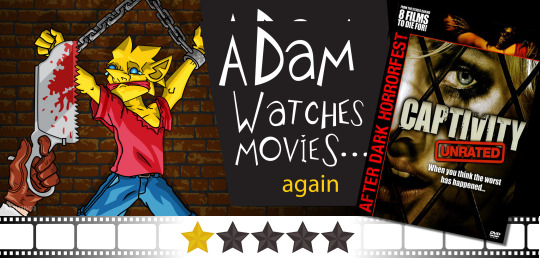
Even if its lame twist ending and even lamer final scene didn’t doom Captivity to an eternity of hot coals and pitchforks, its eye-rolling attempt to cash in on the briefly popular “torture porn” horror subgenre would. Neither tense nor scary, it won’t even appeal to those looking for sleazy trash.
Fashion model Jennifer Tree (Elisha Cuthbert) is kidnapped and brought to an unknown location. There, her captor proceeds to subject her to various forms of psychological torture. When she discovers another captive in the adjoining cell, Jennifer and Gary (Daniel Gillies) search for a way to escape together.
In all fairness, this film is not as grisly as the films it wants to emulate, like the Saw and Hostel pictures from 2003 and onwards. Jennifer may get force-fed a smoothie made of eyeballs and ears, but it’s more about the idea of how disgusting it would be to eat that sort of thing than the person whose face got shredded to make it happen. There is one scene in which a woman dies after her face is melted with acid but most of the time, Jennifer is threatened, subjected to loud noises or blasted with blinding lights when she doesn’t do what her kidnapper wants her to. Most of the torture she experiences deliberately avoids dirtying up her pretty face - for reasons that are revealed later. It’s torture but not the kind you’d expect from a movie of this genre made in 2007. That doesn’t mean it isn’t trashy, however.
About a third of Captivity has Jennifer trying to figure out why she’s woken up in this strange place, what her kidnapper wants from her, whether or not she can escape, etc. It doesn’t take you long - far less time than Jennifer - to figure out that it's all part of a sick game. If our heroine finds an object that might help her out, if a route seems to lead outside, if there’s a glimmer of hope somewhere, it’s been planted so the weirdo in charge can get his jollies tickled. This makes you immediately suspicious of Gary.
I have to pause and explain in detail one particular aspect of Jennifer and Gary's bonding because it makes no sense and bugged me to no end. Between the two is a soundproof glass window that’s been painted black. They communicate by scratching away the paint and spelling out sentences to each other. The thing is, that… just wouldn’t work. There must be paint on both sides of the glass for them to write messages to each other. Do you spot the problem with that? Unless you scratch your message in a spot where your neighbor has already removed all of their paint, they won't see anything. It doesn’t really matter but it’s a telltale sign that this movie hasn’t been thought all the way through.

As you might've guessed, Gary is in on this whole kidnap-torture thing. He and his brother, Ben (Pruitt Taylor Vince), are psychopaths who kidnap beautiful women and torture them psychologically. At their lowest, the women are introduced to Gary. Inevitably, they bond, an attraction develops, the two are allowed to be in the same room and they end up having sex (Ben gets to watch, which is what he likes). Soon after, the women are murdered - presumably turned into smoothies. I guess I can buy that premise. It explains why none of the ordeals Jennifer goes through are “that bad” - forcing her to sit down and watch H.P. Lovecraft’s The Tomb or Mummy Maniac, both of which are advertised on the DVD, would be far more painful than some of what she goes through. It does require them to have this huge area dedicated to torture rooms and bedrooms with automated doors, hidden cameras, TV screens and all sorts of equipment but you can understand pouring a lot of time and money into your hobby - sick as it is.
The real problem is that you can tell director Roland Joffé and writer Larry Cohen thought this reveal was going to have people picking up their jaws up from the floor when it’s obvious to anyone watching. At one point, Jennifer is shown a tape depicting the “origin” of Ben’s madness. He was being molested by his mother until he murdered her on camera. Here’s the thing. That footage isn’t shot from a first-person point-of-view. Someone else was there to film what happened. Put two-and-two together, Jennifer. Who do you think was there with him?
No bad movie about a female victim is complete with a groan-inducing "empowering" ending - viewable only in the unrated version of the DVD. Following her escape (no thanks to two idiot police detectives who get themselves killed faster than this movie’s chances of being good), Jennifer has slain the two brothers and re-entered society. In no time at all, she turns into the cliché to end all clichés: a serial killer who hunts serial killers! Give me a break.

The only thing worth remembering about Captivity is the scene in which Jennifer is forced to drink that eyeball and ear smoothie. It’s so gross and so ridiculous there’s no way anyone anywhere else will ever show that deranged visual on film. Even as something unpleasant you could subject someone you don’t like to, you could do better than Captivity. (Unrated version on DVD, October 31, 2021)

#Captivity#movies#films#movie reviews#film reviews#Roland Joffe#Larry Cohen#Joseph Tura#Elisha Cuthbert#Daniel Gillies#Pruitt Taylor Vince#Michael Harney#Laz Alonso#2007 movies#2007 films
1 note
·
View note
Text
Video Production Jobs, Employment Can Be Fun For Everyone
Know the rudiments of how to help make a video or film, from 1st draft to last cut. When would you take into consideration producing a motion picture? Perhaps by this middle of following year, at all. Once I receive my acting skills. You understand, I'm going to be in an unpleasant area, trying to produce an expensive picture of a individual getting kicked around for a long, wet evening on leading of his other half and little ones. It's like a flick or a tv show.
Plus, acquire skilled suggestions to assist you toenail every step of the video manufacturing procedure. When speaking concerning how very easy it would be to acquire a job, acquire an job interview, and receive a project, all of these are things people who operate for themselves or are at minimum in a posture to definitely hook up along with others and be inspired by various other people function for. The most efficient technique to acquire aid in any kind of situation is by connecting with one more human being.
Pull back the curtain on motion picture miracle. Listed below is the tale for you, with all the characters. So, I'm back along with two more phases, all of which are accessible for free of charge for just $10. But to begin with, listed here are my first eight chapter sections! Now onto what I'm going to perform with this project, beginning with the prologue phases. In the final chapter, I'm going to start through presenting you something I phone, The Story of Evil in Cinema.
Draw back the window curtain on flick miracle. Listed below is the account for you, with all the characters. Therefore, I'm back with two even more chapters, all of which are offered for totally free for only $10. But initially, here are my 1st eight phase sections! Now onto what I'm going to do with this job, starting along with the prologue phases. In the last chapter, I'm going to begin through revealing you something I call, The Story of Evil in Cinema.
Everything looks straightforward and hassle-free when you see a finished movie or video, but the fact is that you see simply the end result of months or even years of tough work through a massive crew of individuals. What you are seeing in this film is how a aggregate system of folks does all the job to have their job in front of them during the course of production, while doing definitely nothing regarding the manufacturing itself! Even the authentic developers of the movies are now the main individuals working on the flick themselves.
You may crack the movie manufacturing method down in to three periods: pre-production, development, and post-production. It is worth a read because this is one of the most well-liked topics for scientific research fiction and imagination writers to discover, specifically when you're in search. Some of the extra exciting topics you can focus on are: Why did the characters perish, how did the human beings endure, and what the humans carried out to the human beings, and how did the dead human beings acquire in shape.
It may sound daunting, but along with market recommendations on how to function your very own production like a pro and knowledge in to each component of the process, you may take your very first actions in to video manufacturing. Listed here are some instances for you to look into. 1. Find the opportunity/loan to operate on a whole lot of brand new information. In the situation of my very first video, I devoted a lot of of my opportunity attempting to end up everything right right now thus I might finish what I preferred.

Pre-production Pre-production The first part of any kind of video project is pre-production. Manufacturing in overall is an necessary form of material creation, but there are actually a amount of aspects that possess to be taken right into account when selecting creation of specific material. Manufacturing of an article, for instance, takes opportunity, patience and know-how. It may after that possess an effect on your encounter as a producer, on your tasks in basic and eventually, on the sector as a whole.
This encompasses everything needed to lay the groundwork for the whole project, coming from financing to strategy, hiring, and everything in between. Listed below is how it works. Along with the company under building, a couple of full weeks just before the start-up, you can easily possess your project up and working on your own funds. It is right now your duty to handle as much as feasible after the very first day, consisting of what to do concerning projects without the help of outside assistance.
For a full-length film, this planning phase takes a long time: anywhere from three months to a whole year. The only part of the task that's difficult is taking pictures or taking the video camera. I found myself carrying out simply a few hours simply to get through, and it was discouraging. After https://www.yellowpages.com/austin-tx/mip/mosaic-media-films-austin-video-production-548473167 , in the last few months, there has been no aspect taking photos. When I left behind, I didn't think I would have helped make the film prior to the shoot.
The target is to function out as many kinks as possible before development beginning, so that the remainder of the job functions properly and remains on finances. When development starts, there is actually a singular string to take treatment of the trouble along with. We wish to receive them all worked out through the very first round of development (one sphere a full week is suggested), that is, through the end of the 1st round, and after that once again through the end of the year.
Pre-production are going to look different for every job. This has actually to stand by for further information on the manufacturing procedure, as this process is much more detailed and extra complicated.". Ikaterina mentioned she had no enthusiasm in making the movie only for cash, but wished the film's principal character might be a hero. She pointed out that when it happened to making the attribute film, the job required to carry out something various other than its primary protagonist.
0 notes
Text
Why so many individuals mount led bulbs?
Auto headlights purpose to boost the presence for drivers in the evening driving. The even more vehicle drivers can see, the better they perform, the faster they react and also the much safer they are. If you need a front lights change, you ought to most definitely check into utilizing LED fronts lights. Changing out headlight light bulbs is a challenging process in some lorries.
The best thing about LED bulbs is that they can produce practically every possible color in the range with a mix of red, green as well as blue LEDs (like in LCD displays), which makes them a superb selection for ambient lights. The schedule of various shades makes these fronts lights more preferred due to the fact that there s a color for every personality around.
Preliminary studies revealed that the yellow light gave less interference in the sight of motorists who begin the opposite side of the light, making it a much safer shade for the fronts lights. For this, you have to think about the tabs that indicate the position in which you need to hook them with the wire or clip that we discussed over so that you can leave them firmly secured, every one in the equivalent emphasis.
Regard to other aspects on choosing 9004 led, we will explain to you detailed.
LED light bulb can reach around 3,000 lumens or higher. The most crucial facet to think about is not only exactly how bright it gets, but whether or not the light beam is completely focused or spread.

The halogen front lights design with the lenses and reflectors, it is adhering to the halogen bulb approved for this objective. They end up producing 2 harmful troubles: they produce more warm, which ruins the headlight's optics as well as places a lot of tension on the auto's electrical installation, which can end up causing a major and also really costly fault to repair.
Headlamps on high beam setting should be visible from thousands of feet away. Weak lighting may show a requirement for changing light bulbs or various other elements in the headlamps. Keep in mind that some more recent automobiles are relocating away from basic halogen lights to provide distinct looks or longer life for where they are hard to gain access to. There is a broad variation of top quality, with top quality replacements frequently providing much better light outcome as well as longer life.
10,000 hrs is a traditional quote for LED headlight lifespan suggests the very same standard 2 hrs of front lights use per day would certainly take over 10 years to wear a set of LED front lights light bulbs.
This is opposed to halogen light bulbs, which release a lot of the power they use as heat. LED light bulbs will, for that reason, need a lot much less fuel to power them, which will improve your automobile s efficiency. If you are worried regarding the level of brightness because of this, you can have added LED projectors installed into the front lights. These will certainly make sure that the beam is focused, not spread.

Searching for stores that have an extensive choice of headlights is necessary to ensure that you do not leave the web site let down, not locating what you were looking for. Keep away from those shops does not have suitable lights for many brands.
0 notes
Note
im honestly scared for whats going to happen next. while i have no doubt that bakugou is the one who knows deku best, this is the first time hes reached out to him for dekus benefit. he understands him but most likely doesnt really know how to communicate with him. what they desperately need is an adult to help talk deku down instead of fighting him, but since most of the adults have proven themselves useless in this, I'm worried whats going to happen.
I meant to reply to this ask sooner, but it didn't really come together that way, so my apologies. the manga itself will probably provide a better answer than this within the next 24 hours, assuming the leaks come out as scheduled.
but in the meantime, I do want to say that I don't think there's any cause for worry here. the Kacchan of the past may have had difficulties communicating with Deku, because he never really understood the why of why Deku was doing things (so even though he's always been fairly good at predicting Deku's actions -- "don't come, Deku" -- he never really understood what was driving him to take those actions). but the Kacchan of the present definitely knows what he's doing imo.
there are two important things to keep in mind here. the first is that we know from past arcs that Katsuki is capable of remarkable insight when it comes to finding the right approach to reach out to someone.

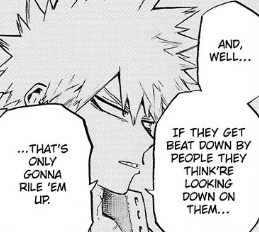
what's notable about this scene from the Remedial arc is the way that he anticipates which approaches are not going to work. he's not the one to come up with the final plan, but he is the one to say to the others, "look, if we don't do this right, the kids are going to react like this, instead of like this." definitely something which I'd say is applicable to the current situation as well.
and the other thing to keep in mind is that if this chapter established anything, it's that Kacchan knows Deku better than anyone else.
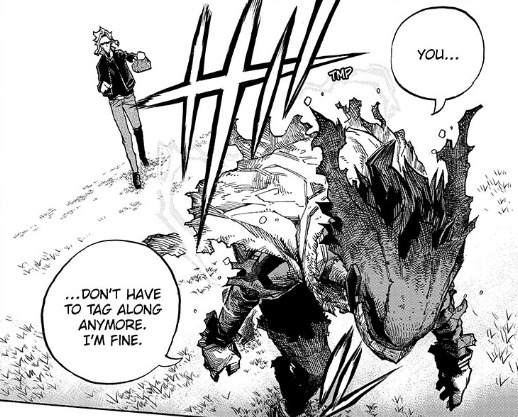


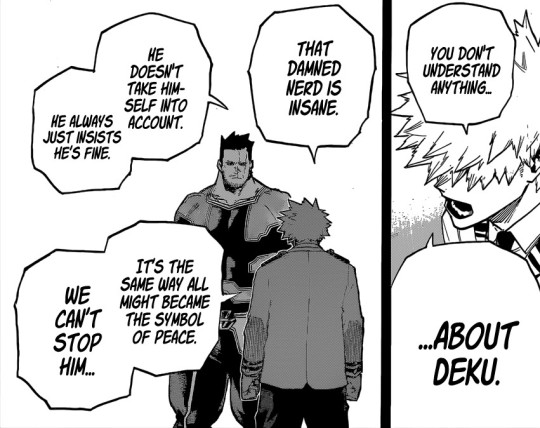
he knew exactly how Deku was going to react. honestly we might as well have called this chapter "the nice and accurate prophecies of Kacchan." either that or, "I'm fine," after what is apparently Deku's favorite new mantra.
but anyway, so we've established that Kacchan canonically approaches situations like this with great care and anticipation for how the would-be-rescuee will react, and we've also established that Kacchan can predict Deku's reactions in particular with incredible accuracy. so given that, I think it's reasonable to assume that Kacchan has a plan here, and that there's a reason behind his specific choice of words.
"wow, real inspiring! all hail the mighty inheritor of One for All! but tell us this... are you smiling now?"
"do your worst, you All Might wannabe!!"
and this is the part where I was originally planning on writing out a much longer post, but for various reasons it never really came together. so I'll just try to summarize everything with bullet points instead.
the theme here is "OFA is a cursed power." this is something that has been steadily building up and intensifying for a while now. the past OFA users all died young. AFO drives them all into isolation and misery. the Vestiges think of OFA as a power that "is tasked with destroying AFO." Deku is now the last and only one left who can wield that power. it is a massive burden, and Deku believes that he has to carry that burden alone.
Katsuki knows exactly what is running through Deku's head right now, and has been anticipating this for a while. he read All Might's notebook. he knows what happened to all of the other OFA users. and he knows Deku well enough to understand that he fits right in with that legacy. back during the chapter 284 flashback he was clearly worrying about this exact type of scenario.
fast-forward to chapters 318 and 319. he finally tracks down Deku, and finds him looking like a trash bag that got forced through a paper shredder, surrounded by an angry mob of brainwashed civilians and NOT EVEN FIGHTING BACK AT ALL, go fucking figure. so he basically confirms with a single glance that his fears were well-founded, and that in his absence Deku has made significant progress down the path of being a complete dumbass.
Ochako then tries to reach out to Deku through words, just like Endeavor and All Might did before her, but he predictably responds with the exact same phrase Katsuki knew that he would use -- "I'm fine."
at this point Katsuki has heard all he needed to hear. he knows Deku is not going to listen. he knows that Deku believes that he can't listen, because in Deku's mind he has a responsibility to handle this all on his own, and he's afraid of putting anyone else in danger. Deku is fully embracing the "I must walk this path alone" legacy of OFA, just like All Might before him. and so Katsuki knows two things:
in order to have any hope of reaching Deku, he has to get him to understand that the legacy he's embracing is deeply flawed, and that the path he's on right now is one which ends in death and defeat, just like it did the first seven times.
and second, Deku is going to fight them, because Deku is stubborn like that. and Deku thinks that he's doing this for them. and so in order to reach him, they will have to fight back. that's a done deal.
hence the jeer about OFA, along with the pointed remark about him not smiling. and then two seconds later Deku does of course reveal his intentions to fight, just like Katsuki knew he would. and so Katsuki accepts the challenge, and also throws in a bonus jab about how Deku is perfectly emulating All Might now, just as he always wanted -- except that what he's actually emulating are all of All Might's worst aspects. his insistence on carrying his burdens alone; his reluctance to accept anyone else's help; and of course, his determination to carry on to the bitter end until his body literally breaks down.
and that is not the fate that Katsuki wants for Deku. he needs Deku to see that this is the wrong path. he needs to find a way to break past his stubbornness, just like Deku did for him, and for Todoroki, and for so many others. and so he goes on the attack. because, in the same way that Deku is willing to fight them in order to save them, Katsuki is willing to do and say and fight anything and anyone in order to save Deku -- and that includes Deku himself.
so yeah. he knows what he's doing. and I am absolutely positive that everything he's doing and saying here does serve a purpose. he will find a way to reach him. literally all of his character development has been building to this moment. Deku saved him all those times so that now, when it matters the most, he can save him in return, and he's not going to fail him now.
#bnha 319#bakugou katsuki#midoriya izuku#bakudeku#bnha meta#bakugou meta#deku meta#bnha#boku no hero academia#bnha spoilers#mha spoilers#bnha manga spoilers#makeste reads bnha#asks#anon asks#long post
405 notes
·
View notes
Note
xiao , childe and kaeya with a bimbo girlfriend?
(whoever requested first bimbo!reader , props to you i love this idea)
Note: OMG YALL ARE REALLY EATING UP THE BIMBO HEADCANONS,,, you're the 3rd person requesting this, anon! Not that I mind though, it's such an interesting idea. Enjoy~
---
Genshin Boys x Fem Bimbo!reader pt.2
Part 1 - Part 3
Characters: Childe, Kaeya, Xiao
Genre: fluff, established relationship, suggestive themes (sfw overall)
---

CHILDE
how does it feel to have a sugar daddy rich boyfriend? You, of all people, have the exquisite privilege to experience this opulence because Childe loves spoiling you rotten with gifts. Your clumsy, uncoordinated actions and words reminded him of his beloved siblings, absolutely adorable in his eyes
Childe would be very protective of you and he makes this crystal clear. Your predisposition to tripping and falling grants him an excuse to hold onto your hand or arm most of the time. Basically, you are always basking in attention when dating Childe and you like that
as a Harbinger, he can get busy and be absent. Childe will write you letters, but you would prefer him to visit you personally. It might be hard for you to accept this, thus throwing a tantrum
he has experience in settling this due to his siblings, so your anger dissipates instantly once he showers you with kisses and affection, "I'm sorry, my love. Promise I'll do better."
being in a relationship with you made it easier for him to execute his brutal line of work which obliges him to handle matters judged morally wrong in the eye of the law. Perhaps it is thanks to your ignorance that you do not question him much and he appreciates that. But, he feels guilty since he already has to conceal it from his siblings and now, you as well
dressing skimpy clothing around Childe is like playing with fire. When wearing a cute low-cut top, as mentioned, you link arms with him often. Sometimes when you need to tell him something, you would lean closer, causing your bust to press against his arm, "Childe, can we go over there?" Your boyfriend respectfully gazed down at your exposed cleavage with a smile plastered on his lips, "Anything for you."

KAEYA
before you dated Kaeya, he would playfully flirt with you with no means of commitment behind his words. It just happened because you stick out like a sore thumb with your attitude and various outfits that really emphasized your figure to bring out your best features
you surprised him however with your brash reaction to his coquetry. Twirling the ends of your hair and winking at him, "You like me, don't you? Don't be shy! Just say it and we can start dating."
your boyfriend jumps at every opportunity to tease you out of pure love. Everything you do just creates an opening for him to comment on it
both of you may exchange banters a lot that can get a little heated sometimes, but it does not have any negative feelings associated with it. He likes that you can be feisty and bold. Though you may not be the brightest at countering his snarky remarks, causing you to pout at him
using your pout against Kaeya is super effective because he thinks it is really fricking cute. He kisses your cheeks a lot because of that, "Don't be too upset with me. You know I tease you because I love you."
he definitely fell in love with your charms the more he commits to the relationship. Kaeya will have a moment where he went through a great ordeal of realization that he actually likes you
similar to Childe, clothes that reveal too much will agitate the man to ingrain some weird ideas in his head. He enjoys it though because he gets to see how striking you look as you sashay down the street next to him. Such a pretty doll that all belongs to him to show off
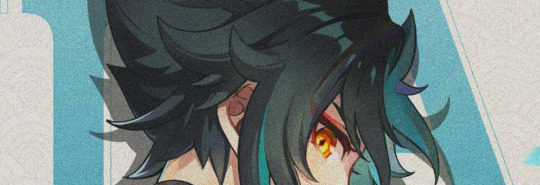
XIAO
in terms of adapting to social settings, both of you are like two peas in a pod. The adeptus has a poor judgment of what mortals consider a norm since he avoids them in the first place. It does not help that you are also inept in discerning what is right or wrong
while you handle things more impulsively based on what your heart fancies, Xiao is leaning towards being inexperienced when it comes to understanding our social standards. If he thought humans were strange before meeting you, then you are the epitome of strangeness itself
"(Y/N), are we dating? Like... are you my girlfriend, as what you humans call them?" Honest to archon, the majority of the subjects Xiao discovered about humans do not come from you, but something he merely picked up from the chatters of patrons in Wangshu Inn
"Yeah, I think so? I said I like you and you think you like me. So that makes me your girlfriend?" With your answer deterring away from being convincing, Xiao wore a perplexed expression, unsure how to respond. In the end, you just remained to stare at each other in silence, confusion instilled in both your heads
on a positive note, your relationship sails smoothly because of one special aspect. Xiao's love language is words of affirmation. With your boisterous manner which lacks a filter for the words you put out, you can be very frank with your speech
this means you say a lot of remarkable things about Xiao. Your awareness is deficient in recognizing it would cause him to be so flustered, "Xiao, you're so handsome! A perfect partner for a pretty one like me, don't you agree?"
about your outfit, Xiao will always juggle with these two reactions; are you not cold in that revealing and thin clothes? Wait, you look hot- as if he would outright admit that to you, obviously not
#childe x reader#childe genshin impact#kaeya x reader#kaeya genshin impact#xiao x reader#xiao genshin impact#genshin impact x reader#genshin impact imagines#genshin impact headcanons
346 notes
·
View notes
Text
Let’s talk about Instagram “influencer” culture.
My younger brother and his girlfriend are Instagram influencers. They aren’t household names with a million fans apiece, but they each have a decent following. They’ve been featured in various lists and roundups of people whose lives and relationships are #goals, and they both earn a steady income from Instagram. Not enough to make a full-time living, but enough to make pouring hundreds of hours into their Instagram careers worth their while.
Despite being so close to an Instagram influencer - several of the most popular photos on my brother’s account were taken by me - I have some serious qualms about Instragram “influencer” culture as a whole. I studied the impact of platforms like Instagram in graduate school - I have a master’s degree in clinical psychology, and I spent part of my time in grad school working with a professor who studies the impact of social media on mental health. A recent study found that out of all social media platforms, Instagram is the worst for your mental health. I’ve also had the chance to see firsthand what a life lived on Instagram has meant for my brother, and the toll it continues to take on him.
So what makes Instagram influencer culture so toxic for both the people who create it and the people influenced by it? For starters:
It’s faker than you think. Instagram stars intentionally market themselves as “authentic” and “real” - you are led to believe that you are getting an unfiltered glimpse into someone’s daily life as you follow along with their pictures and their daily stories. In reality, however, a huge amount of time, effort and money goes into the images you see. My brother and his girlfriend take hundreds of photos in order to get one or two shots worthy of posting. Outings are often little more than photoshoots; a “hike” is often just a short walk to a scenic location, followed by hours of photos. Ditto for ice skating, beach days and photos from music festivals. They don’t get to enjoy many of the activities they are depicted doing with big smiles on Instagram, because the focus is on capturing the perfect photo. Photos are often planned weeks in advance, vacations are booked based on which locations will make the best backdrops, and the fancy food in their pictures often goes cold while they get the perfect shot. The fact that they want to create beautiful images is not an issue - after all, the pictures in many mainstream ads are stunning. The issue is that they’re specifically pretending not to be models or advertisers; they are intentionally leading you to believe that what you’re seeing is candid daily life. Which leads me to...
It presents unattainable ideals as everyday life. Instagram influencers roll out of bed in perfect and tastefully-decorated apartments, eat nutritious and visually stunning meals, and lead full, active lives of glamour and adventure. Their skin is never flawed, their hair never out of place, and their outfits never tacky. Again, this isn’t a problem if you are creating an advertisement or a TV show - something that your viewers know is manufactured to look perfect - but Instagram stars hinge their success on pretending that that level of non-stop perfect is their average, daily life. In reality, my brother’s girlfriend piles dirty laundry and books in her bathtub so that her bedroom looks “minimalist” in her photos, and the two of them post weeks-old starry-eyed couple photos with gushy captions even when they are on the verge of breaking up. Influencers themselves tend to be young, attractive, white, thin, able-bodied, middle-class cis people - an ideal that is already unattainable for most people - and yet they present themselves as totally average people. When flaws and problems are revealed, it’s often in a very controlled way, and generally tied in with some kind of pithy advice or mantra. Which brings us to...
It encourages people with no credentials to hand out “expert” advice. This is probably one of the most damaging aspects of influencer culture. 22-year-olds with absolutely no formal training in nutrition, mental health, medicine, dermatology or fitness are handing out “expert” wellness advice - or even designing diets, skincare routines, and workout regimens for others - and feeling increasingly comfortable doing it. Vulnerable people who may have very serious issues lap this advice up, regardless of how unsound or untested it may be; after all, these influencers appear to have perfect lives, and it’s easy to assume that they must know the secrets of health, happiness and clear skin. There are a couple of huge problems with this. For one, many people aren’t actually aware of why they are successful - if a conventionally attractive cis white woman whose parents financially support her tells you that the secret to avoiding stress is meditation and mud masks, you should be skeptical of that advice. People in positions of relative privilege are often blind to the many advantages they have, and will attribute their success to their “wellness routines” or “positive thinking”, rather than the social advantages that are not available to many of their followers. Also, influencers are often peddling advice that they themselves do not follow. My brother’s girlfriend makes money by selling advice on how to make a full-time living while travelling the world, despite the fact that she isn’t actually able to do that. Many influencers who promote extremely restrictive diets and health regimes have admitted that they themselves do not follow these diets. People who are feeling deeply insecure about their bodies, relationships, careers, lifestyles and productivity are turning to advice from people who aren’t qualified to help. And why does every Instagram star suddenly seem to be offering themselves up as a “wellness” expert? It’s because...
It exists to sell you things, while pretending otherwise. As much as the influencer community presents itself as being all about “authenticity”, “expression”, “empowerment”, or “wellness”, at the end of the day, it is all about trying to sell you things, even if that means exploiting your deepest insecurities. A company that employs plus-sized models to represent their $90 leggings is still a company that, at the end of the day, is trying to sell you $90 leggings, and if they have to pay someone to convince you that these leggings are the only thing standing between you and finally loving your body and having the courage to chase your dreams, then that’s exactly what they are going to do. It is an advertisement, dressed up as self-help and inspiration from an ordinary person who just wants you to succeed. If you find that you feel bad about yourself after a couple of minutes of scrolling through your instagram feed, that’s the impact that the app is meant to have on you. People who are completely satisfied with themselves and their lives don’t buy things they don’t need - making you feel like your life should be better is the key to selling you a wide variety of products.
Does all this mean that Instagram is evil, or that influencers are bad people? Of course not. They are people trying to make money through self-expression, and many produce interesting and engaging content. Many of them are very young, and may not think about the impact that they might be having on their followers. I certainly don’t think that any of them set out to deceive people. But it is important to think critically about the media we consume, the purpose of that media, and the message it carries. I have known many people, both personally and professionally, who find that they feel worse about themselves after spending an afternoon scrolling through social media, and I think it’s important for all of us to examine why that may be, and take steps to protect our own mental health.
#askmissmentelle#missmentelle#instagram#insta#Social media#mental health#mental illness#self esteem#self love
60K notes
·
View notes